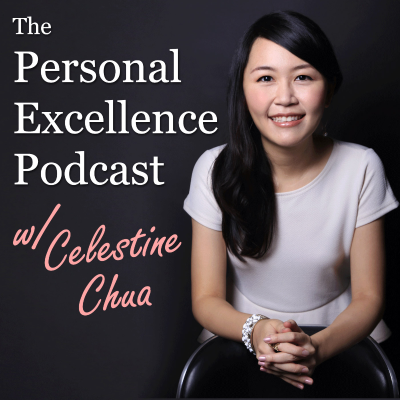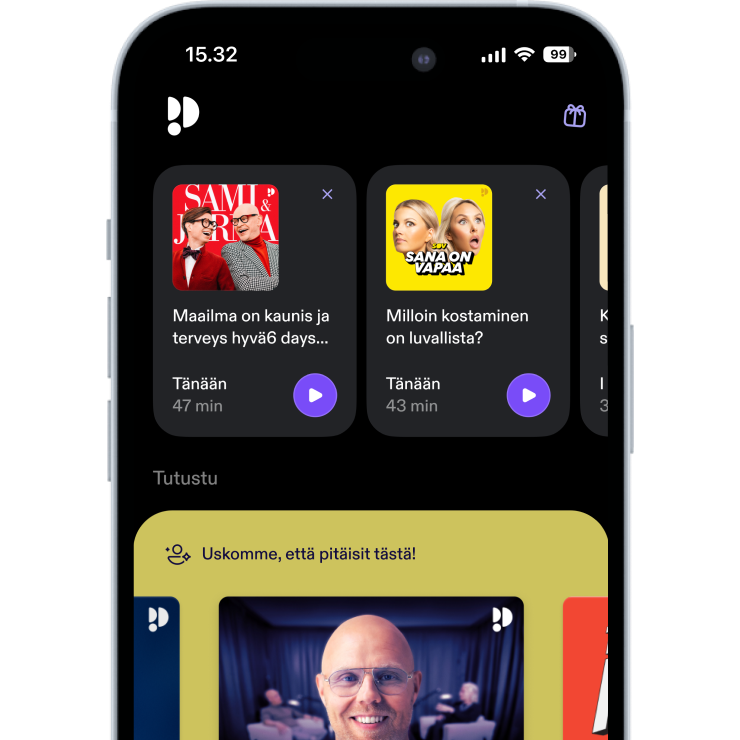
The Personal Excellence Podcast
Podcast by Celestine Chua
Rajoitettu tarjous
2 kuukautta hintaan 1 €
Sitten 7,99 € / kuukausiPeru milloin tahansa.

Enemmän kuin miljoona kuuntelijaa
Tulet rakastamaan Podimoa, etkä ole ainoa
Arvioitu 4.7 App Storessa
Lisää The Personal Excellence Podcast
Hi, I’m Celestine Chua, founder of PersonalExcellence.co, one of the top personal development blogs with over 400,000 pageviews per month. The Personal Excellence Podcast is about how to live your best life in today’s world. I share practical tips on personal growth, from improving your personal productivity, to achieving happiness, to dealing with life’s setbacks. Let’s get started!
Kaikki jaksot
17 jaksotSad girl, walking away with her teddy bear [https://personalexcellence.co/files/girl-sad-teddy-bear.jpg] Have you ever felt this way before? That nobody loves you? If so, you’re not alone. I’ve felt that nobody loves me before, and in fact felt this way during many of my down moments in the past, such as times when I felt neglected or pushed aside. It was only lately that I learned to break out of this thinking pattern, and today I want to share how you can do so too. In this latest episode of The Personal Excellence Podcast, I share * Why there have been a lack of updates lately (and my apologies about it!) [0:22] * Why I would feel that nobody loves me [2:47] * How I addressed this negative thinking pattern, and how you can too [4:49] * Why it’s not true that nobody loves you [5:26] * Where true self-love should come from [10:48] * Why celebrities face self-love issues despite having the love of millions of fans [12:23] * What happens when you pursue a relationship for the sake of feeling loved [13:27] * Getting to the root of why you think “nobody loves me” [15:31] * My childhood experiences that led me to this belief [16:18] * Times when I was bullied in school [20:29] * How I resolved these negative memories [23:41] * My gratitude to you guys [29:02] * An exercise for you to dig into the belief “nobody loves me” [30:45] * How to start building up your self-love [35:01] * Why there is no dichotomy between self-love and personal growth [37:24] * My reminder to you [38:46] Listen to the podcast via my online player [https://personalexcellence.co/podcast/nobody-loves-me/#player],Apple Podcasts [https://personalexcellence.co/itunes/],Spotify [https://personalexcellence.co/spotify/],Google Podcasts [https://personalexcellence.co/googlepodcasts/],Stitcher [https://personalexcellence.co/stitcher/],TuneIn [https://personalexcellence.co/tunein/], or subscribe directly to my RSS feed [https://personalexcellence.co/feed/podcast/]. The Personal Excellence Podcast [https://personalexcellence.co/files/pe-podcast-logo-tn.jpg]The Personal Excellence PodcastListen OnApple Podcasts [https://personalexcellence.co/itunes/]Listen OnGoogle Podcasts [https://personalexcellence.co/googlepodcasts/]Listen OnSpotify [https://personalexcellence.co/spotify/]Show MenuPODCAST SUBSCRIPTION MENU * Listen on Stitcher [https://personalexcellence.co/stitcher] * Listen on TuneIn [https://personalexcellence.co/tunein] * Listen on Castbox [https://personalexcellence.co/castbox] * Listen on PocketCasts [https://personalexcellence.co/pocketcasts] * Listen on Overcast [https://personalexcellence.co/overcast] * Subscribe via RSS [https://personalexcellence.co/feed/podcast/] Nobody Loves MeNobody Loves Me [https://personalexcellence.co/files/girl-sad-teddy-bear.jpg]Show Podcast InformationIf you've found The Personal Excellence Podcast useful, I'd really appreciate it if you canleave an honest rating and review on iTunes [https://personalexcellence.co/itunes/]. Your review makes a difference and will help spread the message of conscious living to the world. Thank you! NOBODY LOVES ME [TRANSCRIPT] Welcome to The Personal Excellence Podcast. The show that’s all about helping you be your best self and live your best life. Now, your host, Celestine Chua! Celestine Chua:Welcome to The Personal Excellence Podcast Episode 17, I’m Celes from PersonalExcellence.co! First off, I want to apologize for the slow updates in the past months, if not year. For those of you who are not on the PE newsletter, do join — it’s at personalexcellence.co/newsletter [https://personalexcellence.co/newsletter/]. Even though there hasn’t been much updates on the blog, I’ve been sending out email updates that are not posted on the blog. So maybe you don’t see as many updates there but there have been emails sent out — sometimes weekly, sometimes fortnightly, sometimes monthly. If you are on the newsletter, you’ll get access to all of that including announcements of live courses that I’m running. All that said, I totally recognize that there has been a lack of updates on PE. A large part is because I’ve been busy working on things in my personal life. Things that I feel are important, that deserve my full attention, as opposed to repeatedly running in a rat wheel and working on things that are urgent but may not be as important. I felt that I needed to take time out to work on these things. But I want to let you know that I have not abandoned PE. Not at all. Those of you who are longtime readers will know that PE is my life. It is what I’ll be doing for the rest of my life, and I’ve just been taking this temporary time out to work on personal things, personal issues, which I look forward to sharing more in time to come. I want you to know that I’m here to stay and I’m not going anywhere. :) Thank you for your positive reviews on Tunes — reading them has really inspired me. In fact, I was thinking what new content to produce — Should write a new article? Create a new podcast? Or create a new video? — and reading all your podcast reviews have inspired me to return to the podcast and talk to you guys again. TODAY’S EPISODE: NOBODY LOVES ME On to today’s episode, about “Nobody loves me.” Have you ever thought that way before? Where you feel that nobody loves you? If so, I can understand. There have been times when I felt this way, particularly during my down moments or times when I felt neglected or disregarded. For me, one of the reasons I would think this way is due to my childhood upbringing. When I was young, my mom was pretty much emotionally unavailable. She cared for me and my brother in terms of how a housekeeper or house carer would — like she did all the functional duties like laundry, cooking, etc., something that a traditional Chinese mom would do. And I’m really grateful to her for that, for raising me and my brother along with my dad. But she was pretty much emotionally unavailable, and I’m not sure if she ever is [emotionally available]. For the record, both my dad and mom are alive today. So whenever I needed something from her, needed to talk to her, or wanted to talk to her in any way, she would be very angry and scold me for no reason, or just be very critical and angry in general. Any contact with her was explosive if caught at the wrong time, and as a daughter I never really got to talk to her much, if at all. This weird dynamic, along with the fact that I grew up in an angry household (something that I mentioned in my anger series [https://personalexcellence.co/blog/anger/] where my parents argued every single day in a very volatile manner), cultivated this feeling in me (growing up) that nobody loves me. It was only when I took the time out to address this feeling that I was able to break out of this negative thinking pattern. If you sometimes find yourself thinking “nobody loves me,” I want to let you know that you’re not alone. Here I share the steps that I have taken to work through this belief, and I hope you’ll find them helpful. 1) IT’S NOT TRUE THAT NOBODY LOVES YOU The first thing I want to say is that it is not true that nobody loves you. When we are too trapped in our problems, it is often easy for us to forget or miss out on the love and the good that are around us. For example, when I was thinking things like “nobody loves me,” right beside me would be my husband who loves me with all his might and has always been there for me. It’s interesting to see that when we are so stuck in our own problems, we miss out on these obvious things — the people around us who love us. Love here doesn’t have to be romantic love. These people can be friends, co-workers, relationship partner (if you are in the relationship), mentors, teachers, an acquaintance (someone you don’t know well, but this person may adore you or admire you or like certain things you do), or even just a stranger — someone who is admiring you from afar. So there can be all these people loving you, admiring you, and adoring you, and it is totally not true that nobody loves you. If you stop and think and look around you, chances are you’ll find at least one person who loves you. Who supports you, and who is there for you or has been there for you, and it’s just that you haven’t been focusing on this love or this person. You have been too wrapped up in your own pain, which then leads to the thought of “Nobody loves me.” It’s important to recognize this first and foremost because when we are too stuck in our own pain, that makes us block out the love that’s around us. When we block out the love that’s around us, that makes it difficult for us to receive love into our life. EXERCISE: THINK OF SOMEONE WHO LOVES YOU Here, stop and think. Think about the people around you. Think about your friends, your family members, your co-workers or your schoolmates, your mentors/teachers, your acquaintances, or just anybody in general. Think of at least one person who shares positive feelings about you. This can be feelings of love. Of admiration. Of like. Of support. Of encouragement. It doesn’t have to be romantic love because love isn’t just about romantic love, but here it’s love in terms of human universal love. Think of at least one person who loves and supports you. Chances are you’re going to think of one person. This can be someone who has supported you before. Encouraged you before. Been there for you before. It could be an ex-friend, a friend whom you were in contact with before and then somehow lost touch. It could be someone from your past. It could be someone in your present now. When you start recognizing this, it starts to change this dynamic, this thought of “nobody loves me.” Because then you realize, Hey this may not really be true in the way that I think it is true. At the end of it all, I want you to know that I love you. That’s important for me to say to you because the very premise of why I started PE is that I truly, truly believe in your potential for success in life. That’s why I create all these resources at PE, be it the free resources or the paid courses. These are resources that I’ve dedicated my whole life, my whole self into creating because I believe in your own personal ability and personal power. So I just want to put it out there that I love you. But most importantly, there are people in your life who love you. Be aware of these people, beyond what I’m saying here. Be aware of these people and start being open and recognize love around you as and when you see it. 2) TRUE SELF-LOVE SHOULD NOT COME FROM AN EXTERNAL SOURCE Lotus bud [https://personalexcellence.co/files/lotus-bud2.jpg] The second thing I want to share is that love should not come from an external source. Now, even if you truly think that nobody loves you — and like I shared in tip #1, I love you, so there’s me — but even if you truly, fundamentally think that nobody loves you, well that doesn’t really matter. It doesn’t matter because love (for ourselves) shouldn’t come from an external source. True self-love should fundamentally come from within us. This is important to recognize because we shouldn’t be looking upon the outside world for the feeling of love. So it’s not about whether you have the love of one person or 10 people. It’s not some competition where you try to get as much love as you can from others. True self-love should come from within. And when the love isn’t coming from within, or there’s something stuck inside keeping the love coming from within, then it doesn’t matter how many people are loving you right now. You would still not truly feel the love from around you. You would still feel those moments of self-negativity because it hasn’t clicked on the inside yet, in that you haven’t resolved this inner issue or the inner turmoil, and that’s something I talk about in tip #3. EXAMPLE: CELEBRITIES DEALING WITH SELF-LOVE ISSUES An example would be celebrities. It’s not uncommon to see news about celebrities dealing with addiction, overdoses, or deep inner problems. Oftentimes this is because of personal inner issues that they’re working through. Issues of self-love. Depression. These can be people like Selena [https://www.psycom.net/selena-gomez-anxiety-depression-therapy-self-care] Gomez [https://www.reuters.com/article/us-people-selenagomez/selena-gomez-reveals-instagram-addiction-low-self-esteem-idUSKBN16N2NZ], Justin Bieber [https://pagesix.com/2019/03/11/justin-bieber-opens-up-about-struggling-a-lot-feeling-disconnected/], Demi [https://www.dailymail.co.uk/tvshowbiz/article-2174674/Demi-Lovato-reveals-used-self-harm.html] Lovato [https://www.dailymail.co.uk/tvshowbiz/article-2111364/Demi-Lovato-reveals-battles-daily-eating-disorder-self-harm-issues.html], and even celebrities in their 30s, 40s, and 50s. This is nothing to be ashamed of. It’s important to seek help for this. But it is important to recognize that these celebrities have millions, hundreds of millions, and billions of fans adoring them. Even then, despite all the adoration they get from the fans and their huge popularity, they still feel moments of such intense negativity that lead them to their personal issues. This is also why inSoulmate Journey, which is my course on finding love, one of the very basic foundational modules is the importance of self-love. Because if we seek an external relationship on the basis of wanting to feel love, that’s not really going to solve the problem. It’s going to attract fear-based people. Or put you in a codependent relationship where you often seek your partner’s attention to feel loved. And when you don’t [get that], then you feel needy and clingy or you feel unhappy and upset. This brings me to this quote by Ayn Rand, which is “To say I love you, one must first know how to say the ‘I’.” Here, the point is not to focus on how supposedly “nobody loves me.” Because it is not about whether nobody loves you or somebody loves you, but why would it matter whether somebody loves you right now? Why would this matter, if not for the fact that there is a feeling of emptiness within that’s causing you to feel this way? Now this doesn’t negate what we are talking about in tip #1 which is to recognize that there is somebody who loves you. But rather, when we stop to think about the people around us who love us, and that there are people around us who love us (be it love, admiration, adoration, support, or encouragement), and yet we still find ourselves thinking “nobody loves me,” then it suggests that there’s some kind of gap, issue, or blockage within that’s stopping us from receiving the love. 3) UNDERSTAND AND ADDRESS THE SOURCE OF “NOBODY LOVES ME” This brings me to my third point, which is to understand and address the source of this feeling. Here is where we really get to the root of it: understanding the source of this belief, “Nobody loves me.” * How did it start? * When did it start? * Why is this thinking there? This may take a while to unravel, and it may even go deep into your childhood. Because this is where most of our foundational beliefs start forming [https://personalexcellence.co/blog/childhood-stories/], and this forms the basis of a lot of the work that I do with my participants in my courses. MY EXPERIENCE: GROWING UP WITH AN ANGRY MOTHER For me, when I think about this thought “nobody loves me,” there are probably two key sets of experiences leading of this. One of which I shared at the beginning of the podcast, which would be my childhood upbringing, where my mom was just not really there. Like not there in terms of the spirit, if it makes sense. I felt like she was there in terms of someone who performed the functional duties of a mother — which I am grateful to her for, for raising me and my brother — but it was somewhat damaging to me, I think, the way that she raised me in terms of the other elements of her behavior. Such as her anger outbursts and how she would often shut me off, even in times when I needed her. So there was a time when I had fever and I think I was 13 or 14. I was a young kid and running a somewhat high fever. She was going to take me to the doctor, like I told her about it and the next step would be to take me to the doctor. On the way to the clinic, she started shouting, criticizing, and reprimanding me for walking slowly. And I was already dizzy and walking in the hot sun and trying to keep up with her fast walking speed. So that was one memory. Another experience I shared in my article on childhood stories [https://personalexcellence.co/blog/childhood-stories/]. When I was young, and I was six or seven at this time, there was soap that went into my eyes and I thought I was going blind. I was smarting in my eyes and I already knew from past experience that my mom would tell me not to disturb her while she went about her household chores. But in reality, she was never free. My mom was just never available regardless of what was happening. Lonely child [https://personalexcellence.co/files/child-lonely.jpg] So I knew from experience that I shouldn’t talk to my mom, or that I should avoid triggering any negativity by simply not talking to her. So that was a moment when I was really scared. I was scared that I was going blind. So I started to tell her about this, and true to that, she started shouting at me, saying that I was disturbing her. When I pressed on further because I truly was feeling discomfort in my eye(s), she just quickly looked at me and said I was fine, and then brushed me away and continued doing what she was doing which was laundry at that time. All these moments added together, alongwith the constant arguing in the household [https://personalexcellence.co/blog/anger/] between my mom and my dad on a daily basis, all these moments created a feeling of void and emptiness. And this was not something that I was aware of at that point as a child. I think as children, we are just not aware of the feelings going through [our minds]. But that doesn’t mean that these feelings are not happening. We are not aware of these feelings forming, but they do affect us in our life, if not at that point in time. So thinking back, when I thought about why I would have this recurring thought “Nobody loves me,” I realized that a part of the reason is that all these moments, this upbringing, created a feeling of void in the family and made me feel like nobody loved me. ANOTHER EXPERIENCE: BULLYING IN SCHOOL So there would be one set of experience, family. A different set of experience would be — and this would be to a lesser extent, like the main set of experience is my childhood and my family upbringing — school. Because of all these things happening at the family level and parental level, that make me a very awkward child in school. In the sense that my mom, in addition to what was happening at home, inhibited me from talking when I was a kid. Like literally talking in any way, and this would be a separate topic for a separate post or podcast. But she basically inhibited me from talking, so I never really got to speak or develop my communication skills as a child, except in school. So when it came to school and forming friendships, I was very socially awkward. I couldn’t really express myself or my thoughts in the way I would have if I was given the space to naturally talk as a kid. So that made me socially awkward and made it difficult for me to form proper friendships. So I was bullied in school. You know girl cliques and all these very childish behaviors that would go on in school. And there were guys and guys being nasty to girls and all that too. So there were a lot of these experiences where I would be negatively teased, bullied, put down, or criticized and I never really knew how to handle these situations. These contributed to me feeling worse about myself. Girl alone in the classroom [https://personalexcellence.co/files/girl-classroom-alone.jpg] So these two sets of experiences hand in hand cultivated this feeling of “nobody loves me.” It was when I was 18 years old when I started having the first moments of liberty because that was when college started and I entered university. I started having the starting reins of independence. Of being given the space to handle my life. I guess it was when I was 18-19 when I also truly started the journey of conscious self-development, which I feel should have and could have happened much earlier. But for me, that was when I really started conscious self-development and learning about myself [https://personalexcellence.co/courses/30bbm/], my life purpose [https://personalexcellence.co/blog/life-purpose/], figuring out my values, and so on. DEBUNKING THESE NEGATIVE MEMORIES When I think back to these core moments that caused me to think “nobody loves me,” challenging these thoughts became important. Because it is not true what I had concluded at that point. A) DEBUNKING MY NEGATIVE CHILDHOOD UPBRINGING AND THE CONCLUSION “NOBODY LOVES ME” For example, with the way my mom treated me, how she was emotionally unavailable and so on, when I thought about it, it’s not true that her behavior meant that nobody loves me. I would say a large part of it had to do with herself. Her and herself, and her stories, and maybe the way my grandma raised her. I have no idea how my grandmother raised her; my grandmother has passed away, and to be honest, I don’t know much about the past because these are simply not things that my parents talk about in any way. But I do believe, thinking back, that my grandmother probably treated my mom in a very similar fashion when she was growing up. And there are obviously a lot of baggage and negative stories that come from being part of a low-consciousness upbringing. My parents came from very low-income households and I was raised in a low-income household, and I think that there are a lot of difficulties and problems that come associated when you’re dealing with [deep financial] struggles in life. So I would say that my mom’s own emotional unavailability, issues, and anger, they had more to do with her and her stories [https://personalexcellence.co/blog/childhood-stories/], and the kind of upbringing that my grandparents put her through rather than it being about me. Now as a child growing up, the only conclusion that I could derive at that point, from my own [limited] subset of life experiences then, would be that nobody loves me. Nobody loves me. That I’m alone in this world. That maybe my mom hates me. That people hate me. So thinking back, clearly this is not true. My mom did the best she could. Despite the limited circumstances, she did her best and that’s something that I’m grateful to her for. Similarly, if my mom didn’t love me in the way that she could or my dad didn’t love me in the way that he does, then they wouldn’t have worked so hard in the routines that they were in to raise me. My dad was always busy working in a low-income job, raking in the dough, supporting the family financially. My mom was always busy with the household chores, the laundry, the cooking — just toiling her 30s, 40s, the good parts of her life away to care for the household. These are not easy jobs at all. So clearly this belief is simply not true. B) DEBUNKING MY NEGATIVE SCHOOL EXPERIENCES AND THE CONCLUSION “NOBODY LOVES ME” As for my experience with school, basically these were just kids struggling in their own personal growth, their self-identity, discovering who they were on the inside. Just as I was working through my own problems, the other kids were also working through their own problems. Not really being self-aware. The people, the kids who were being critical [https://personalexcellence.co/blog/critical-people/] or nasty [https://personalexcellence.co/blog/naysayers/], they were just doing their own thing, figuring themselves out. And there was really no need to interpret, even if subconsciously, that any of these experiences had any meaningful meaning because they pretty much didn’t. They were really just a bunch of kids growing and figuring themselves out in life. So thinking back and addressing these stories then helped me break out of this belief of “nobody loves me.” Because it’s simply not true. It was an erroneous belief that was formed from a bunch of random incidences that just happened that way, that really had nothing to do with me. Objectively seeing these incidences as they were and unraveling them then helped me break out of this thought of “Nobody loves me,” and to recognize the love that’s around me, all around me right now, be it the love from my husband, the love from the people around me, the love from people who love me, and the love from you guys. My readers. GRATITUDE TO YOU, MY READERS I want to express how grateful I am to you guys for allowing me to do what I do. Thank you for being patient with me in the past one year or more, where I haven’t really been updating the blog much, where I’ve been busy working through things [https://personalexcellence.co/podcast/challenges-i-am-facing/], and I’ve pretty much been silent. I felt that if there’s nothing good to share, then just don’t say anything — and by that I mean in terms of content. I didn’t (and still don’t) believe in writing and churning out stuff for the sake of it. I wanted everything to matter especially if I’m writing out something and many people would be reading that. I wanted to make sure that it counts for something, that I’m treasuring your time spent in reading my material. And I just want to thank you for supporting my work and allowing me to do what I do. So whatever it is, whatever capacity that you support the blog, be it by just listening to my podcast, reading the emails, buying my products, or joining my courses, I’m grateful for that. I just want to let you guys know and put this out there so thank you so much. :) EXERCISE: PROBE INTO THE FEELING, “NOBODY LOVES ME” Now back to the point which is to understand and address your feelings for thinking this way. If you think that nobody loves you and you have moments when you think nobody loves you, I would like you to start questioning this thought. Start thinking further and probing into this feeling, “nobody loves me.” Because is it really true? Think back to when this feeling started. Chances are it’s going to go back to childhood [https://personalexcellence.co/blog/childhood-stories/]. * Probably from some childhood upbringing. * Some experience you had when you were a child. * Maybe some comment someone said to you. * Maybe a series of experiences that you had. * Maybe from how your parents raised you. * Could also be to do with school experiences. * It could also be from the lack of experiences that you had with your parents, with your mom, your dad. Try to pinpoint and understand where this feeling came from, when it started. As you do that, question this assumption or conclusion of “nobody loves me.” Is it true that because Event A happened that “nobody loves me”? You saw how I shared my breakdown just now. I shared the experiences, or some of them, when I developed this thought, even if unconsciously. At the point when I was a kid, I wasn’t aware that this thought was formed, but as an adult looking back and thinking back, I realized that some of these moments might have led to the conclusion, “nobody loves me.” So then, question the thought: Is it true that because this happened, that Event A happened, that nobody loves me? Chances are you’re going to find that it’s not true. You’re going to find that it was an erroneous conclusion made at that point when you didn’t know better. When you could only conclude things in this way. And then looking back as your adult self today, you’re able to break apart that incident and recognize that this feeling of “nobody loves me” might not really be what you think it was. That it was more of an erroneous conclusion formed at the point in time when you didn’t know better. The above might sound a little bit confusing, and I go into these things much deeper in my courses, but hopefully you understand what I’m trying to say here. There were incidences that happened when we were a child that made us think a certain way, but often time these incidences don’t mean that. And we only concluded that conclusion, that thought, that belief, because we didn’t know better at that point in time. Because there was limited data. And when we truly go back and question that experience, then we find that our belief was formed from a set of poorly formed conclusions, a set of poorly understood experiences. Really take the time out to understand and address your feelings for thinking this way. This tip is super, super important because this forms the foundational basis of how we see ourselves, really addressing this belief of “nobody loves me.” 4) WORK ON YOUR SELF-LOVE Sad woman in forest, sunlight behind her [https://personalexcellence.co/files/woman-sad-sunlight.jpg] My fourth and last tip is to start working on your self-love. So we have already addressed and looked into the fundamental basis of how this feeling of “nobody loves me” got formed. The next step is to work on your self-love, because we can never stop working on that. If we ever feel that nobody loves me, remember here it’s about first loving ourselves. When we love ourselves, and we start loving ourselves, then we’ll be able to truly appreciate and see the love that’s coming from around us. So ask yourself:Are there things that you are doing that’s keeping you from self-love? Come up with a list of actions that you can take to start loving yourself. Maybe you are often really hard on yourself — and this may be something I want to do a podcast on, about not being hard on yourself — but maybe you’re just often being hard on yourself. Maybe you’re often pushing yourself. You’re often berating yourself. You’re often being critical of yourself. And these are things that you shouldn’t do to yourself. These are things that shouldn’t be happening. And these are things that you can stop doing to herself. Now instead, start appreciating you. * Start loving you. * Start loving your body [https://personalexcellence.co/blog/body-image/], if you aren’t already doing that. * Start loving your beautiful facial features [https://personalexcellence.co/blog/beauty/]. * Start loving your hair [https://personalexcellence.co/blog/ideal-beauty/], if you aren’t already loving that. * Start loving your face. * Your whole self. * Your work, what you create [https://personalexcellence.co/blog/perfectionism/]. * Start loving your behavior. * Your actions. * Start loving your goals. * Your attitude. * Your beliefs. There is no dichotomy between self-love and self-improvement. We can love ourselves and also be working on our personal growth at the same time. It is from truly loving ourselves that we see this opportunity for personal growth. And personal growth not initiated or rooted in a place of fear or competition or feeling that we are not good enough [https://personalexcellence.co/podcast/negative-self-worth/]. But rather, personal growth rooted in seeing all the unlimited potential we have and how we can simply be better. So here, as you work on your self-love, also work on the things that you love to do. The goals that you wish to achieve. The things that you wish to do for yourself. Taking the time out for self-care. Taking the time out to support yourself in your endeavors. Taking the time out for your personal goals. Think about the things you love to do. And the things that you can do to start loving yourself or to love yourself more. And start working on them today. CLOSING NOTE We’ve come to the end of the podcast. If you think that nobody loves you, or you have moments when you think that nobody loves you, I just want to remind you that this is not true. There is someone who loves you and most importantly, you love you and you should love you. If ever there’s something blocking you from loving yourself, then it’s simply about understanding what it is. Why this blockage is. Where this blockage is. And then addressing that as I’ve shared in the tips of this podcast. I hope you’ve found this podcast helpful. I’ll be including links to related articles and resources in the show notes, so you can check them out. If you’ll like today’s podcast or you appreciate The Personal Excellence Podcast, I would truly appreciate it if you can take the time out to leave a positive review on iTunes. That would truly mean the world to me and help spread the podcast to more people out there. I look forward to speaking to you guys soon, this time definitely not one year later! Let me know what episodes you guys are interested to see, what kind of topics you guys are interested to see. Or even, you can record a question for me at personalexcellence.co/podcast [https://personalexcellence.co/podcast/]— there’s a link where you can send a voice question over to me. So until next time, remember you’re beautiful, you’re complete, you’re perfect the way you are. Whatever it is, I love you and most importantly, you love you and you should love yourself. Talk to you guys soon. Bye guys! Endnote:Thanks for listening to The Personal Excellence Podcast! For more tips on how to live your best life, visit www.personalexcellence.co [https://personalexcellence.co/] RELATED RESOURCES: * What Childhood Stories Are You Replaying Today? [https://personalexcellence.co/blog/childhood-stories/] * How I Found Peace in My Relationship with My Parents [https://personalexcellence.co/blog/parents/](series) * My History with Anger and How I Let Go of It [https://personalexcellence.co/blog/anger/](series) * How To Deal With Moments of Negative Self-Worth [Podcast] [https://personalexcellence.co/podcast/negative-self-worth/] (Images: Girl with teddy [https://pixabay.com/photos/girl-walking-teddy-bear-child-walk-447701/], Lotus bud [https://unsplash.com/photos/eMTYjiKuYxc], Child alone [https://www.flickr.com/photos/charamelody/4757913318/], Girl in classroom [https://www.flickr.com/photos/76377775@N05/6870398473/], Woman in forest [https://unsplash.com/photos/WcIykZGG1-k])
How To Be Productive, Not Busy [https://personalexcellence.co/files/productive-not-busy.jpg] It is so easy to be busy rather than productive in today’s world. With so many notifications and things screaming for attention, oftentimes, we could simply spend an entire day being busy without getting anything done. So how can we focus on the impactful and make the most of our days? In this episode of The Personal Excellence Podcast, I share * 6 tips to be productive, not busy * Why you should not start your day with chat [1:25] * How to separate communication between inner circle loved ones and others [4:50] * Why I turn off alerts and notifications [8:21] * How to deal with incoming emails, alerts that you need to respond to [10:59] * Starting your day with a priority to-do list [12:44] * Why you shouldn’t beat yourself up when you go off task [14:49] * Using batching to group similar tasks [17:07] * How to create your 80/20 to-do list [20:32] * Using a “Will do” list to defer incoming tasks [20:32] * The importance of delegating [21:59] * Why delegating was my Achilles heel in the past [22:42] * 3 factors I used to determine when to delegate [25:05] * 5 questions to ask yourself in a weekly/bi-weekly audit [29:16] * Asking ourselves WHY, WHAT, and HOW as we live consciously [30:20] Listen to the podcast via my online player [https://personalexcellence.co/podcast/productive-not-busy/#player],Apple Podcasts [https://personalexcellence.co/itunes/],Spotify [https://personalexcellence.co/spotify/],Google Podcasts [https://personalexcellence.co/googlepodcasts/],Stitcher [https://personalexcellence.co/stitcher/],TuneIn [https://personalexcellence.co/tunein/], or subscribe directly to my RSS feed [https://personalexcellence.co/feed/podcast/]. The Personal Excellence Podcast [https://personalexcellence.co/files/pe-podcast-logo-tn.jpg]The Personal Excellence PodcastListen OnApple Podcasts [https://personalexcellence.co/itunes/]Listen OnGoogle Podcasts [https://personalexcellence.co/googlepodcasts/]Listen OnSpotify [https://personalexcellence.co/spotify/]Show MenuPODCAST SUBSCRIPTION MENU * Listen on Stitcher [https://personalexcellence.co/stitcher] * Listen on TuneIn [https://personalexcellence.co/tunein] * Listen on Castbox [https://personalexcellence.co/castbox] * Listen on PocketCasts [https://personalexcellence.co/pocketcasts] * Listen on Overcast [https://personalexcellence.co/overcast] * Subscribe via RSS [https://personalexcellence.co/feed/podcast/] How To Be Productive, Not BusyHow To Be Productive, Not Busy [https://personalexcellence.co/files/productive-not-busy.jpg]Show Podcast InformationIf you've found The Personal Excellence Podcast useful, I'd really appreciate it if you canleave an honest rating and review on iTunes [https://personalexcellence.co/itunes/]. Your review makes a difference and will help spread the message of conscious living to the world. Thank you! HOW TO BE PRODUCTIVE, NOT BUSY [TRANSCRIPT] Welcome to The Personal Excellence Podcast. The show that’s all about helping you be your best self and live your best life. Now, your host, Celestine Chua! Celestine Chua:Hey everyone. That is Celes from PersonalExcellence.co. Welcome back to the podcast! Today I want to talk about productivity — specifically how to be productive, not busy. I feel that in today’s world, it is so easy to be busy rather than to be productive. That’s because we have so many notifications, alerts, to-dos, things screaming for attention. Oftentimes, when we are not aware, when we are not conscious of it, we could simply spend an entire day just doing things, rushing from place to place, clearing item after item. But these things may not be the most impactful things that help us move towards our goals. So today I want to share some simple tips, six tips in fact, on what we can do to focus on being productive rather than being busy. 1) DON’T START YOUR DAY WITH CHAT My first tip is don’t start your day with chat. It is very instinctual to want to open your chat application in the morning and see who messaged you. Thinking, What do I have in my chat inbox? What messages do I have? It feels exciting because you are getting messages from people, people you care about, or new people you just met. Also, it is sometimes like a little gift, like each message is a little gift and someone has a special message for you and you want to see what’s that. So I totally understand that. But unless it is an off day where you are not working, for your work days, I recommend not starting your day with chat because it can easily derail your day into a series of chat exchanges where chat is your main focus, as opposed to what you need to get done. This is especially true if you are an entrepreneur, you control your day, you control your routine, or if you are a freelancer. It is very easy to have your entire day derailed because of chat or even because you are looking at your social media news feed. You know, the social media platforms today. I shared in a previous episode on FOMO, the fear of missing out [https://personalexcellence.co/podcast/fomo/], about how social media applications and platforms today are designed to get you to come back to the platform. When you start your day with chat and this may be a chat application or a chat tool built into a social media platform, you have already entered their arena where there are all these design elements designed to get you to come back to the website. From the notification button color to the placement to the user interface, and so on. The best way is simply not going into chat at the beginning of the day. But instead focusing on the things you need to do. Another reason is that at the beginning of the day, our energy is at its highest and you want to direct that to the highest purpose activities on your to-do list. As opposed to pumping that into chat because then you’ll be putting your best energy into chat messages and replies which may not be the best use of your energy. There is an exception to this rule, which is if the person is a family member, an important loved one, like your partner or your kid. With these people, you should have a channel where they can easily access you. So this could be chat, this could be some other channel. That’s because there could be some urgent family matter or important issue where they need to notify you. Having this instant access lets you know if there anything that you need to tend to and so on. This is where there is a conundrum. Because then you’ll be wondering, Oh okay, if I need to be easily accessible to these people, the problem is when I check messages from them, I will naturally see messages from others. My answer is to use two different chat applications. This is if you find that it’s worth doing that. Using two different applications: (1) One for your super important, inner circle loved ones. The people who need 24/7 instant access to you; and (2) The second for everyone else. The good thing is there are so many applications today. Line. WeChat. Whatsapp. Facebook. Telegram. And so on. Simply designate one app to everyone else, I guess the default channel that everyone uses like WhatsApp and Facebook. And use a different channel that very few people use. Use that channel and allocate that to just your loved ones, like your parents or siblings or your spouse, your children. This way you have a separate channel that’s just for these people and you can use that without all these non-stop notifications, all these elements trying to pull you in. At the same time, you can still connect with the other people in your circle using the general application for everyone. I do that and I find that super useful in helping me stay focused. Before that, I was just using one application for everyone when the one person I communicate with the most and I need to communicate with frequently would be my husband. I found that a lot of times when I was checking the chat application for his messages, I would naturally see the messages from other people. Some of these messages, in fact, most of the conversations were not essential. It’s like banter, casual banter, which is fine and good for socializing, but not to the extent where I need to see it all the time every day. The problem is when you log back onto these chat applications, you know that many of the social media tools today will show what time you were online and many of these tools don’t have a feature for you to turn it off — which is terrible. Then other people will see, “Oh you’re online, but you’re not replying to me. Why are you not replying to me?” And then that’s all this nonsensical stuff which is totally unnecessary. So I find the best way is to simply use a different app for these inner circle people whom we need to communicate with on a very, very frequent basis throughout the day. And also with them, they understand that each of us has things to do. I have my things to do. You have your things to do. And our priority is to focus on these things. But at the same time, we check back this application throughout the day, just in case there are urgent matters, home matters, household issues, etc. that we need to see and deal with. Another way that one of my ex-professors uses is having two different phone numbers. One number for close family members. Another for everyone else. That can work too if you are okay with using two different numbers or you have a dual SIM card phone. Otherwise, using the two chat applications, that works pretty well. 2) REMOVE DISTRACTIONS My second tip is to remove distractions. By that I mean the notifications, the alerts, all these different things that are so common and part and parcel of every application, software, website that we use or visit nowadays. I find them very intrusive. I always turn off all these notifications and alerts. Whenever I install something new, if I have to install — So firstly, I rarely install new apps or software, only the essential ones. That’s very important, knowing the key things you need to have and saying no to everything else [https://personalexcellence.co/blog/say-no/]. Then, with the apps that I do install, I will disable all the alerts, notifications, and so on. On your phone, there is an overriding feature in Android — I’m not sure in iPhone — where you can disable notifications. This is a phone-level setting, not a setting with the individual app. In the “Settings,” I think it’s there on most Android phones, there’s a feature in “Applications” where you can turn off notifications for each individual app. Doing so overrides the notifications for that app, if it doesn’t give you that option to turn off its notifications (which I find quite common in today’s applications). So turning off these alerts. Email alerts as well. I don’t have email alerts. I only check emails at specific moments of the day when I’m taking a break from my core task. Because when I’m doing a task, especially a high-level task, just having this stream of incoming notifications, be in terms of SMSes or email alerts or any app notifications, I find them very disruptive and they often take my mind from a high-level mode to a very low-level reactive mode. When there are all these notifications going on, even if no active notifications right now, I don’t enter into high-level mode because I’m constantly sitting in wait for the next alert, the next message, the next notification. So I’m sitting there, in reactive mode, anticipating, Okay there could be a next alert, so I don’t want to enter into this high-level thinking mode where I’m thinking about ideas or writing an article and so on. Some of you may be in positions where you need to be accessible all the time. For example, maybe you are an account manager at a PR agency and you need to be accessible to your clients. That is totally understandable. For these situations, I recommend designating fixed moments throughout the day where you check your messages, emails, return calls, and so on. This could be once every hour, at the start of the hour or once every 40 minutes. It could also be after you finish a task or a segment of a task. This way you introduce some structure into your days, as opposed to being in reactive mode 100 percent of the time. You want to be clear on the Quadrant 2 priority tasks [https://personalexcellence.co/blog/put-first-things-first/] that you want to get done, while being responsive to the incoming alerts, the firefighting staff you have to handle as part of your job. In our job, it’s common to have a lot of Quadrant 1 tasks, which are the firefighting stuff, the urgent and important tasks. And there are the Quadrant 2 — the very important but never urgent tasks. We want to strike a balance between getting the Quadrant 1 tasks handled, and also having the time to work on the Quadrant 2 tasks that never become urgent but it is important to work on them to make significant headway towards our goals. 3) HAVE A PRIORITY TO-DO LIST My third tip is to have a priority to-do list. Get clear on the 2-3 key things you would like to accomplish for the day for it to be rewarding. As part of this priority to-do list, you can have other things that you need to get done too. For example, scheduling this doctor’s appointment or returning this critical email and so on. These are little tasks that may not be in the top 2-3 things you need to get done, but you need to get them done as part of moving things forward. But in this to-do list, you want to be clear of what are the 2-3 key things, the big rock items, that you want to spend a substantial or considerable amount of your time working on and make good progress in them. When we don’t have a priority to-do list, it is really easy to spend our entire day working on 10 to 20 little things. But these 10 to 20 little things often don’t make a significant change or a significant dent in our Quadrant 2 goals in the long run. So we could be spending our entire day doing all these little things every day and constantly busy, thinking, I’m rushing and doing this and that, I’m multitasking, I’m doing all these different things. But that is not a good use of our time. If anything, when we are doing all these things, we are running in our rat wheels, as opposed to taking a good look at the tasks that require our time and energy, the tasks that we should be working on. When trying to transit from this working on 10-to-20-different-things mode, to the work-on-2-to-3-big-items mode, we can often feel a lot of resistance. Because there’ll be all these things trying to pull us away from our priority tasks. All these things screaming for attention, firefighting stuff, seemingly super urgent critical stuff. I would recommend not seeing it as an absolute change that you need to make. Like, Oh, okay, I must just do these 2-3 big things and that’s all. I don’t want to do anything else. Oftentimes it is a transition that we do where, okay, we spend some time on the 2-3 big things. We know what they are. We spend some time on them. But there would still be the little things that come in. Do what you can do. Do your best to hand those little things. Once you’re done, go back and focus on those 2-3 big items. See this priority to-do list as something to anchor you, to remind you of your priority to-dos. But don’t get pressurized or stressed by those things. For example, if you don’t make significant progress on these things, or you don’t even get to spend any time on these things today, don’t beat yourself up, okay? Don’t feel bad about it. Because it’s really normal. It is super normal especially when you are at the intersection of a million to-dos and a million things demanding attention, to sometimes have days where you’re working on these million things as well. That’s fine. Just do what you can to get these things sorted out and then direct your focus back to your 2-3 priority to-dos. That is the most important thing. Constantly making the effort to shift back to your priority to-dos, as opposed to taking it as an absolute standard that you have to follow.Because that can lead to a self-defeating mindset, a self-defeating situation where you feel bad, and you beat yourself up, and that isn’t what we’re going for here. 4) BATCH SIMILAR TASKS My fourth tip is to batch similar tasks. Often times you will probably find a recurring pattern in the tasks that you do. And when you start seeing a similarity in certain tasks, it helps to batch them. Batch them meaning, let’s say you need to return email number 1 and then, later on, you need to return email number 2, and number three, and number four, and so on. So as opposed to logging into your inbox every 5 minutes to return one email, I recommend batching all these tasks together. So you can spend 1-2 hours on a Quadrant 2 task, and then at a specific point in the day, log into your email and reply to all these emails together. Another example is, say, you are a website designer. You are maintaining four different client websites. Say there are several changes that you need to make to website number three. And there are constantly new changes streaming in each day. Maybe it makes sense to batch all these little changes you need to make, and then make them at the end of the day or at a fixed moment of each day. As opposed to making no changes on an ongoing basis throughout the day. Because there is always a set-up cost involved for each task. Where you need to log into a certain interface, you need to key in certain details, you need to set your mind in that mode, and then you need to assess that situation and think about what you need to get done. This setup cost happens each time you work on a task. When you have many little tasks for an overall project, and you keep repeating the same steps even if each time you are doing one small little task… Say you have five little tasks for this big project. This setup time quickly accumulates. Before you know it, you would have spent the entire day on this setup time and this “switching cost” where you’re constantly switching from task one to task two. Even if you are a superb multitasker, which I’m sure many of you guys are, there’s always this cost involved. Again like what I share in Tip #2 on removing distractions, you’re forever spending your time in this reactive mode, this low-level mode, where you are doing all these administrative switching things, as opposed to getting into the high-level mode where you are making significant changes. So as much as possible, batching similar tasks together. This does require you to take a step back to evaluate and assess what are the tasks that keep taking up your time each day. Often times we are not aware that this is happening until we take a step back to write down the tasks that have been taking our time throughout the day, and start to see a similarity or trends in these tasks. This is where having a “Will do” to-do list helps. InLive a Better Life in 30 Days Program [https://personalexcellence.co/courses/30dlbl/], the task for Day 8 is to work on your 80-20 to-do list. For the to-do list, * 20% high-impact tasks.I recommend having a column where you write down your 20 percent high-impact tasks, i.e. the tasks that will make the biggest impact, that will be the best use of your time for the day. This would correspond to the priority to-do list in Tip #3. * 80% low-impact tasks.Then have another column which consists of your 80 percent low-impact tasks, and these will be the tasks that need to get done, the little tasks that are not the best use of your time but need to get done. * Will-do tasks.And then another column which would be the “Will do” to-do list where you write down the tasks that stream in throughout the day and you need to get them done. But you don’t need to do them right away. Oftentimes a lot of the things that we think what we need to do right away, we don’t really need to do them right away. Putting them in the “Will do” column and then assessing them at the end of the day and tending to them, helps us see the similarity in these tasks and batch them so that we can deal with them more effectively. 5) DELEGATE My fifth tip would be to delegate. Now I know that this tip wouldn’t be applicable to those of you who are not in a position to delegate. But for those of you who are, maybe you are an entrepreneur, or you are at a managerial position, or you’re working in a team where the other co-workers handling different tasks, then it is important to learn to delegate. Even if you are not in the position to delegate right now, there will likely be a time in the future when you move to a different position in your career or you move up the value chain in your career ladder, where you would need to learn to delegate. I have to say that delegating has always been my Achilles heel because firstly, I like to be hands-on. I like to be in the thick of the things that I’m working on. I will say that I’m a creator. I get the satisfaction of creating stuff and you guys can see that. Like with my entire website, Personal Excellence, I’m very hands-on. The entire website is built by me and so on. When I delegate, I stop working on that particular stuff that I’m delegating. That removes one small piece of satisfaction because the creation process is where I get a lot of satisfaction. The second reason is that I don’t like to trouble people. I don’t like to implicate others or burden people with my problems. I just like to handle things myself and internalize and deal with them as much as possible. So for a long time, I just didn’t like to delegate. I would just do everything myself as much as I can to the point where I would feel like bursting. But I have found that delegating is an important skill. It is a crucial skill if you want to do much more than you are able to with your own bare hands.Because we can never accomplish as much if we are always relying on ourselves. We can always do more when we have an extra set of hands helping us.We can always do more when we have two different brains working on a problem. This is something that I took very long to learn. Nowadays I’m learning to do that more. Delegating, identifying which are the parts of my business where I should delegate and let someone else handle and help me in them, while I work on the higher-level stuff that is the best use of my time. With regards to delegating in my business, I have three factors that I use to evaluate whether I should consider outsourcing or hiring. 1. Repetitive.Is this task repetitive? Is it highly recurring? If it is highly recurring, it has a high frequency, that means I should potentially look at hiring someone to handle this. 2. Value of the task vs. my time.Is it the best use of my time? Or can my time be better spent elsewhere? When you are running a business and as your business matures and as your customer base grows, you start to be involved in many, many different tasks of many different functions. So you could start your business and many things are important. But there will be a point where there are just so many tasks and many things are important, but it’s just not possible for you to handle everything. And that will be certain tasks that are more important than others and that are a better use of your time.For example, in my business, there could be marketing, editing, audio editing, video editing, site maintenance, content creation. And all these things individually by themselves are important. But is every task the best use of my time? Or can my time be better spent elsewhere? And it is a very critical question because unless we consciously evaluate the value of our time and whether this time can be better spent on Task A or B or C, we will forever be in this mode where we feel that everything is important and everything deserves our time.But when we stack up all these tasks side by side, it becomes clear that there are certain tasks are a better use of our time than other tasks. And these tasks that the best use of our time, oftentimes they are the critical aspects of our business and our work. And us putting energy into them can create the biggest rewards. 3. Pros vs. Costs of hiring.The last factor, whether the pros of hiring outweigh the costs. Because there will always be a cost involved when you’re looking at hiring or outsourcing. Now if you’re delegating to someone in your team, in the company that you’re working in, then the cost element wouldn’t really be applicable. But if you are a business owner or entrepreneur, then the cost element would be involved. Even if say if you are delegating something in your personal life — so you could be working in a company but you are looking at delegating aspects of your personal life, say household cleaning, grocery shopping, or potentially getting a helper, then the pros need to be weighed against the costs and whether it’s worthwhile. When you’re dealing with something that is highly repetitive, is not the best use of your time, and the pros of hiring outweigh the costs, then you should look at kickstarting the hiring process. It can be pretty difficult to get good talent, good people to help you or good services to help you. In some cases, it may not be hiring someone as much as you are engaging a service to help you in that thing. But once you find someone who can help you or a service that can help you, you will find the rewards tremendous. Because now you can take a load off your shoulders and dedicate your mind space, your time, your energy on the things that truly would be the best use of your time. 6) DO A REGULAR AUDIT My sixth and last tip is to do a regular audit. Audit meaning you look back at how your week has been and you ask yourself: 1. How has this week been? 2. Am I satisfied with how I’ve spent this week? 3. Have I spent this week on the most important things on my task list? 4. Could I have spent this week in a better way? 5. Moving forward what changes would I like to make, if any? Asking yourself these questions can be very helpful because oftentimes we are just heads down in our work, our tasks, trying to complete item after item. We often don’t take this step back to get a macro focus on what we are doing, how we are doing things, whether that’s a better way for us to do something. Without this audit, we can forever be stuck in this micro mode, just rushing from place to place, finishing task off the task. Before we know it is already been weeks and weeks or even months, and we look back and we wonder, Where has all this time gone? Doing this audit helps us take a step back and think about these three points: 1. WHY.Why are we doing this? Is this the best use of all time? 2. WHAT.The things that we are doing. Are these truly the best use of our energy? Are these the things that will be moving us towards our highest goals? 3. HOW.The way that we are doing things, the approach that we’re using right now, is this the best approach? Can there be a better approach? Can there be a better way to do things? So you can do an audit every week, every two weeks, or even every month. But the point here is to do an audit. Use the audit as a chance to evaluate how you have been spending your time, because it is so easy to be stuck in work mode, busy mode, and spend all the time that way without really thinking about whether this time has been spent effectively. An audit is this chance, this opportunity where we can take that step back to really think about how our days have gone, how weeks have been spent, and whether we can do things in a different way. CLOSING NOTE Productivity is when we are consciously spending our time. Consciously approaching our days and thinking about how we can make the most out of it. Busy, in a way, can be considered a lazy way of living. In that, you’re not really thinking about the things that you’re doing as much as you are just doing them. While it is very important to have a good work ethic, which is what being busy is about, you want to make sure that your time is being spent in the most impactful way. This is what productivity is about: Working hard, while at the same time making sure that your hard work is creating the highest impact. Making sure that your energy and your efforts are creating the biggest impact in the world. So that’s it for today’s episode. Thank you so much for listening. I have an article that shares more tips on how to be productive versus busy [https://personalexcellence.co/blog/busy-productive/] that you can check out in the show notes. I’m going to link that in the show notes, along with links to some other resources related to today’s podcast. If you have found today’s podcast helpful, I would super appreciate it if you can leave a review on iTunes. You can do that at personalexcellence.co/itunes [https://personalexcellence.co/itunes/]. Every review goes a long way to helping the podcast to grow and towards spreading the message of conscious living further. I want to take this chance to thank all of you guys who have posted such positive reviews and sending such wonderful feedback to me through the contact form. I read everything single one of your messages and I’m so grateful for your support. So thank you so much to you guys. You guys know who you are. So that’s it. Until next time, remember: you are beautiful, you are perfect, you’re perfect the way you are. Talk to you guys in the next episode. Bye guys and have a great week ahead. :) Endnote:Thanks for listening to The Personal Excellence Podcast! For more tips on how to live your best life, visit www.personalexcellence.co [https://personalexcellence.co/] RELATED RESOURCES: * Busy vs. Productive: 7 Tips to be Productive, Not Busy [https://personalexcellence.co/blog/busy-productive/] * How Social Media Creates a Fear of Missing Out (And What To Do About It) [https://personalexcellence.co/podcast/fomo/] * Put First Things First [https://personalexcellence.co/blog/put-first-things-first/] * How To Achieve More With Less Using The 80/20 Principle [https://personalexcellence.co/blog/80-20/] * Is Your Goal Worth 30 Minutes of Your Time Every Day? [https://personalexcellence.co/blog/30-minutes-a-day/] * Live a Better Life in 30 Days Program [https://personalexcellence.co/courses/30dlbl/]
Girl alone in the forest, with a road before her [https://personalexcellence.co/files/girl-alone-forest.jpg] Have you ever felt like you’re alone sometimes? That you’re facing life’s struggles but you’re going through so much pain alone? That no one seems to understand what you’re going through? I hear you. Today, I just want to record a quick podcast to let you know that you’re not alone. Listen to the episode below: Listen to the podcast via my online player [https://personalexcellence.co/podcast/not-alone/#player],Apple Podcasts [https://personalexcellence.co/itunes/],Spotify [https://personalexcellence.co/spotify/],Google Podcasts [https://personalexcellence.co/googlepodcasts/],Stitcher [https://personalexcellence.co/stitcher/],TuneIn [https://personalexcellence.co/tunein/], or subscribe directly to my RSS feed [https://personalexcellence.co/feed/podcast/]. The Personal Excellence Podcast [https://personalexcellence.co/files/pe-podcast-logo-tn.jpg]The Personal Excellence PodcastListen OnApple Podcasts [https://personalexcellence.co/itunes/]Listen OnGoogle Podcasts [https://personalexcellence.co/googlepodcasts/]Listen OnSpotify [https://personalexcellence.co/spotify/]Show MenuPODCAST SUBSCRIPTION MENU * Listen on Stitcher [https://personalexcellence.co/stitcher] * Listen on TuneIn [https://personalexcellence.co/tunein] * Listen on Castbox [https://personalexcellence.co/castbox] * Listen on PocketCasts [https://personalexcellence.co/pocketcasts] * Listen on Overcast [https://personalexcellence.co/overcast] * Subscribe via RSS [https://personalexcellence.co/feed/podcast/] You’re not aloneYou’re not alone [https://personalexcellence.co/files/girl-alone-forest.jpg]Show Podcast InformationIf you've found The Personal Excellence Podcast useful, I'd really appreciate it if you canleave an honest rating and review on iTunes [https://personalexcellence.co/itunes/]. Your review makes a difference and will help spread the message of conscious living to the world. Thank you! YOU’RE NOT ALONE [TRANSCRIPT] Welcome to The Personal Excellence Podcast. The show that’s all about helping you be your best self and live your best life. Now, your host, Celestine Chua! Celestine Chua:Hey everyone, Celes here from PersonalExcellence.co. Today, I just want to record this podcast to let you know that…you’re not alone. For some of you listening to this, maybe you’re going through some kind of problem right now. Some kind of struggle, issue. Whatever it is that you’re going through, I just want to do a shout-out and let you know that you’re not alone. I know that life can be really sucky sometimes. Sometimes, we can be trying our best but we face obstacle after obstacle. Sometimes we may be dealing with problems that are so difficult that we wonder if there will ever be a way out. Sometimes it can be a tough struggle just getting through life itself. And whenever we are going through times like this, it can feel very isolating and very debilitating. If you’re experiencing any struggle or pain right now, I just want let you know that you’re not alone and I totally understand how you feel. I myself, I have been going through problems myself too. I shared a couple of episodes back on the work and business challenges that I had been facing in the past years. If you haven’t listened to the episode, you can check it out here:Challenges that I’m Facing Today [https://personalexcellence.co/podcast/challenges-i-am-facing/] I also face life struggles as well. I find that the world today is a little bit of an alienating one for me. I find myself increasingly distanced [https://personalexcellence.co/blog/disillusioned/] from the way the world is today, the mass society I mean. Consumerism, all the mad chase for money as an end goal in itself. The pursuit of certain objectives without interest or care for the society and the universe at large — which I find somewhat depressing. I just feel a general alienation in terms of the person I am today, the kind of values that I want to uphold and follow, from the general values of the society that I’m living in, which is very much about materialism [https://personalexcellence.co/blog/materialism/], self-driven pursuits, and blind conformism. So I do feel alone in that respect. I understand if you are going through health struggles or any kind of chronic issue or condition. I was going through a series of chronic, symptomatic health issues — and it’s all okay now — but I was going through some symptomatic health issues in the past years (which I may write about in the future). The process of seeking help, trying to find a solution, trying to uncover what the heck is going wrong — it was a frustrating and a bit of an isolating one. Because I found that certain health care practitioners may not really care about you and what you are looking for, as much as it’s more of a patchwork scenario, where they just want to cover up the symptom or fix the symptom (with unnecessary medication or medication that may cause other problems in the long term) as opposed to really uncovering the root issue. And I find this somewhat common in today’s Western healthcare. So whatever it is that you’re going through… Work. Health. Relationship. Life issues. General struggles. Pain. Frustration. Financial worries. Financial struggles. I just wanna let you know that you are not alone. I have written about quite a number of the issues [https://personalexcellence.co/articles/] that I used to face. For example, * Emotional eating, binge eating [https://personalexcellence.co/blog/emotional-eating/] * Body image struggles [https://personalexcellence.co/blog/body-image/] * Feeling inferior about my looks [https://personalexcellence.co/blog/beauty/], my body [https://personalexcellence.co/blog/feet/], my femininity [https://personalexcellence.co/blog/femininity/] * Going through heartbreaks [https://personalexcellence.co/blog/heartbreak/], moving on * Growing up in a dysfunctional family unit [https://personalexcellence.co/blog/parents/] * Having trouble [https://personalexcellence.co/blog/singlehood/] finding love [https://personalexcellence.co/blog/intimidate-men/] for a long time [https://personalexcellence.co/blog/love/] * Disappointment [https://personalexcellence.co/blog/disappointment/] * Work struggles [https://personalexcellence.co/blog/the-night-i-cried/] * Anger issues [https://personalexcellence.co/blog/anger/] If you are facing any of these issues, feel free to check out the series that I’ve linked to above. There, I share detailed tips on what I went through in the past and how I worked through these issues. Hopefully, you’ll find these tips helpful for you. Whatever it is that you’re going through — just keep at it. Keep at it and stay strong. Do what you can. We may not be able to change all the problems that we’re dealt with. We may not be able to change everything around us. But we do what we can. We do what we can to improve and change the situation. We do what we can to solve the problems. Soon, we will find that the good things will start coming our way. That things will start moving up. And things will get better. This I promise you. Things will get better as long as you keep trying and keep going. Just never give up. So that’s it for today’s episode. If you have a question for me, any issue or problem that you’re facing, feel free to post your question via the podcast page at personalexcellence.co [https://personalexcellence.co/podcast/]. There, you can record your question in the form of an audio clip and I may well answer it in the next episode. Until next time, remember: You’re perfect. You’re beautiful. Sending a HUGE hug to you wherever you are in the world. Remember you’re not alone, okay? Bye guys! Endnote:Thanks for listening to The Personal Excellence Podcast! For more tips on how to live your best life, visit www.personalexcellence.co [https://personalexcellence.co/]
How Social Media Creates FOMO (and What To Do About It) [https://personalexcellence.co/files/fomo.jpg] FOMO — or the fear of missing out — has become a pattern in today’s world. We are constantly on our phones, glued to social media feeds and checking what other people are up to. The more updates we see, the more anxious we feel. We see people living this exciting life, achieving this new milestone, doing that exciting activity. We feel like we are missing out, that we are not living a good enough life, and we have a compulsion to keep up. So we keep up… buying, keeping up, and absorbing as much information and updates as we can. And this addresses our anxiety… or does it? Can you relate? Well, today’s episode is just for you. :) In this episode of The Personal Excellence Podcast, I cover * What is FOMO [0:29] * Signs of FOMO [1:27] * 4 reasons why FOMO exists [4:39] * 5 strategies to tackle FOMO [15:06] Listen to the podcast via my online player [https://personalexcellence.co/podcast/fomo/#player],Apple Podcasts [https://personalexcellence.co/itunes/],Spotify [https://personalexcellence.co/spotify/],Google Podcasts [https://personalexcellence.co/googlepodcasts/],Stitcher [https://personalexcellence.co/stitcher/],TuneIn [https://personalexcellence.co/tunein/], or subscribe directly to my RSS feed [https://personalexcellence.co/feed/podcast/]. The Personal Excellence Podcast [https://personalexcellence.co/files/pe-podcast-logo-tn.jpg]The Personal Excellence PodcastListen OnApple Podcasts [https://personalexcellence.co/itunes/]Listen OnGoogle Podcasts [https://personalexcellence.co/googlepodcasts/]Listen OnSpotify [https://personalexcellence.co/spotify/]Show MenuPODCAST SUBSCRIPTION MENU * Listen on Stitcher [https://personalexcellence.co/stitcher] * Listen on TuneIn [https://personalexcellence.co/tunein] * Listen on Castbox [https://personalexcellence.co/castbox] * Listen on PocketCasts [https://personalexcellence.co/pocketcasts] * Listen on Overcast [https://personalexcellence.co/overcast] * Subscribe via RSS [https://personalexcellence.co/feed/podcast/] How Social Media Creates a Fear of Missing Out (And What To Do About It)How Social Media Creates a Fear of Missing Out (And What To Do About It) [https://personalexcellence.co/files/fomo.jpg]Show Podcast InformationIf you've found The Personal Excellence Podcast useful, I'd really appreciate it if you canleave an honest rating and review on iTunes [https://personalexcellence.co/itunes/]. Your review makes a difference and will help spread the message of conscious living to the world. Thank you! FEAR OF MISSING OUT [TRANSCRIPT] Welcome to The Personal Excellence Podcast. The show that’s all about helping you be your best self and live your best life. Now, your host, Celestine Chua! Celestine Chua:Hey everybody, welcome to The Personal Excellence Podcast! This is Celestine Chua from PersonalExcellence.co. Today we’re talking about the fear of missing out, otherwise known as FOMO. Have you heard the term FOMO before? I’m sure some of you have. But if you haven’t, FOMO refers to the apprehension that one is not in the know, or one is out of touch with some event, experience, or interaction.This compels the person to constantly want to know what’s going on, what’s happening out there, and whether they’re missing out on something. In today’s world, FOMO exists on some level in many of our social media habits and online behavior — even if you don’t realize it. This is why I want to discuss this topic today because I feel that FOMO has become such a prevalent issue. SOME SIGNS YOU HAVE FOMO Some signs of having FOMO include * Continually refreshing your social media newsfeed to see what’s going on, what’s the latest update, and the new things that people are discussing right now. * Feeling the need to know what so-and-so people are doing. This can include the people in your social network. It can also include the people you don’t know, such as celebrities or famous people. * The constant feeling that you’re not satisfied with your life, and because of that you keep looking outward at what others are doing. * Feeling that perhaps you are not doing enough. So as opposed to enjoying your time right now with the people you are with and the life you have right now, you are constantly checking and seeing what others are up to, because you feel that otherwise, you may be missing out. WHY FOMO IS UNIQUE TO OUR ERA I feel that FOMO is a phenomenon that’s unique to our digital era. FOMO as a term was coined in 2003 and it was added to the Oxford English Dictionary in 2013. That’s just a few years ago. So why is FOMO unique to our era? Imagine in the past, way before the internet was invented. Say it’s a Friday night and you just finished work. What do you do? Perhaps you would read a book. Perhaps you would do some simple activities. Maybe you like to knit so you knit. Maybe you watch a video of your favorite movie. Or you have a quiet conversation with a loved one. So you do that and you sleep. And you could be feeling pretty satisfied with your Friday night, doing something that you like. Nowadays, everybody is connected. You can see what anybody is doing and everyone’s updates. With the Internet today, typically what happens is this: It’s Friday night. You could be browsing your social media newsfeed and your Instagram newsfeed. * You see this professional coach or guru going to some event, achieving some new level of success, getting this new interview, living the high life. * Or you see this celebrity, this person partying at some gala event, living in some mansion, doing some new photoshoot, or having some brand new product launch. So you could be excited and feeling satisfied with your Friday night, reading a book, knitting, talking to a loved one, whatever it is. But now you are left feeling like you’re boring and lousy because you’re not doing all of these things that these “exciting” people are doing. And that, in essence, is FOMO. 4 REASONS FOR FEAR OF MISSING OUT I see FOMO as the result of a few factors. 1) PREVALENCE OF FAST-SPEED INTERNET First, the wide prevalence of fast-speed Internet. It’s incredibly easy to get information today. In the past, when the internet was new, it was slow and we were on dial-up modem. Some of you guys may still be on dial-up. But in the past, dial-up was the norm. Over the years, as the government, societies build up the infrastructure, high-speed internet became more easily accessible and at a lower cost. Many people around the world have fast internet today. So you can easily get information at the click of a button. With that, you can easily see what people are doing with the click of a mouse. What Brad Pitt is doing right now, what Angelina Jolie is doing right now, what the Kardashians are up to. All this information, just easily accessible at the click of a button. Because of that, you can instantly know what others are doing. This starts this whole comparison cycle and behavior because now you can easily compare and put side-by-side what other people are doing and what you are doing. This starts to create a feeling of lack, a feeling of inferiority, that maybe you’re not good enough. 2) PEOPLE DISPLAYING A PERFECT VERSION OF THEIR LIVES The second factor would be people using the Internet to exhibit their best selves. Along the way (in the 2000s), the Internet became this platform where people get to share about themselves. But now, instead of people sharing about themselves, people are using the Internet to exhibit a very manicured version of themselves. Sometimes this version may not even be true to reality. So there’s a very heavy level of self-monitoring and self-altering behavior going on. We have magazines out there isn’t it? In the media industry, with the magazine editors heavily photoshopping magazine covers, they create this “picture-perfect” version of beauty [https://personalexcellence.co/blog/ideal-beauty/] and very narrow definitions of beauty [https://personalexcellence.co/blog/beauty/]. That’s the magazines and it’s enough that media industry is doing that. But now, instead of this being an issue isolated to magazines (and the media), we have people everywhere on Instagram, Facebook, etc. editing the photos that they upload. Instead of it being an authentic moment — which it used to be, where people were genuinely sharing what they were doing as part of connecting with others —now it’s become a situation where people are sharing very edited, manicured, and perfected versions of what’s going on in their lives. So they could be living their day and essentially doing mundane activities — as with most people living their lives. Some of the things they’re doing will be mundane and usual, nothing to shout about. Then they have this one hour when they are doing something exciting, and then they will take some pictures of that and edit that, make them perfect, add filters, and so on. And just highlight those moments. When you have people everywhere doing this online, it creates this impression of, Oh this is what’s happening in everybody’s life all the time. So I’m missing out! My life is not good enough!This creates a really skewed and warped sense of reality. 3) EXISTING SOCIAL ISSUES MAGNIFIED BY INTERNET The third factor contributing to FOMO is there are simply existing (social) issues that the Internet exacerbated. As opposed to the internet creating problems, I would say there were existing problems such as loneliness or low self-esteem [https://personalexcellence.co/blog/self-confidence/]. The Internet, with the way it has brought the entire world closer and stripped away many boundaries, exacerbated this issue as we no longer have a strong sense of boundary or space. People who already feel lonely or low in self-esteem may feel more isolated, while people who felt slightly lonely at times may have this feeling magnified in the presence of everyone else’s success and “exciting” life. 4) HOW TODAY’S WEBSITES ARE DESIGNED The fourth factor contributing to FOMO is how companies have designed their websites. To understand how this works, it boils down to this underlying principle. Essentially, most companies operate on profit. Well, the essence of a company is to be profitable because if you’re not profitable, you’re out of the game. When companies focus on profit as their sole objective — without regard for their audience and adding value to their lives — their number one goal becomes to maximize each user’s time spent on their website. This is particularly true for platform companies like Facebook, Snapchat, Netflix, Instagram. The more time you spend on their site, the better it is for them, the more advertisers they can get, the more revenue they can get. What’s the best way to maximize the time spent? By maximizing interaction, maximizing the number of engagements you (as the user) have on their site, be it by making you click from one place to the next within their site. Whatever keeps you within the site and gets you clicking, interacting, commenting, and spending as much time as possible on the platform itself — whether it’s Facebook, Snapchat, or Netflix — even if it’s to the point of detriment of your well-being, your productivity, or the utility value you’re getting from the website. This is particularly so when a company starts to focus on profit and what it gets off its user base rather than having the users’ best interests in mind and designing its services around them. This is whereprofit supersedes value [https://personalexcellence.co/blog/profit-value/]— where companies focus on profit rather than giving value, as opposed to creating value as the priority and earning profit as a result of that. So platforms are now creating site designs to build addiction. We have Facebook — or any of these large attention companies really — having large teams of growth hackers, where their sole job every day is to get together to discuss, find ways to hack your brain, and figure out how to break down your mental barriers, so that you’re constantly glued to their platform.Getting you to stay on their site, making you feel compelled to come back, and making you feel, Oh I’m missing out if I’m not coming back to the site. I’m missing out if I’m not clicking this notification. So it could be * Facebook popping up a message and saying, “You haven’t been here for a while” or “You haven’t posted on your page for a while. Do you want to interact with your followers (if you have a Facebook page)?” * Snapchat. They introduced a streak feature in the past couple of years where they encourage you to continue this streak of messaging someone consecutively each day or over a period of days, so that you can maintain the streak. Some of these are questionable. Because, okay, Snapchat has this streak feature to message this number of times or this frequency with someone. But does this help forward your relationship with that person or help you live a better life? These are questions to ask ourselves. So we have these companies coming up with all kinds of strategies. Many of them implicit — you don’t know they are happening unless you take a step back to think. Or unless you run a website yourself, where you become conscious of these issues.Ultimately, they are there to suck you in. To get you addicted. To make you feel like you’re missing out. Hence, the feeling of “missing out.” So you constantly refresh your social media feeds to see what you are missing out. You feel, Okay! When I refresh and the thing is loading in my browser, I’m doing something with my life. Something is happening and I’m seeing all these updates! The page is now loaded, you see this barrage of new updates.Okay! Now I feel marginally fulfilled.Then 30 seconds later, you are back doing the same thing, loading the webpage and seeing the next wave of updates. SOCIAL MEDIA UPDATES — JUNK FOOD FOR THE BRAIN All these are very much what I call, junk food for the brain. It’s like you eat junk food, and maybe for a few seconds, you feel satisfied. After a while though, you feel, Hey I need more! Like,This is not satisfying me. Why is that? It’s because these little pieces of updates are inherently not satisfying or nourishing. Junk food is not nourishing for our body. Media news sites and the attention companies, or any of these websites using these strategies to maximize attention and it can include content mills with very low-quality articles, designed to make you click from one thing to the next — these are junk food for the brain. When you have all this junk food content and you’re consuming it, the quantity may be huge and there may be many pieces of such content everywhere. But because it’s not nourishing for the brain, you have to keep clicking and refreshing and returning just to keep this “nourishment “going. Because it’s so ungratifying, you’re not being fulfilled, and hence you need to do it so many times. Compared to if you are reading a piece of high-quality content, you can be just reading a short amount and that’s food for thought. There’s something you have gained, that makes you think for the next few days. So these four factors contribute to the phenomenon of FOMO. Even in the online business world, FOMO has created the shiny object syndrome. Where you feel this need to constantly buy that next app, that next plugin, that next web service, hoping that you’ll create that next big breakthrough in your business. I’ve shared before in an article on the magic bullet [https://personalexcellence.co/blog/magic-bullet/]— there’s no secret sauce or magic thing that’s going to transform or create some huge results. Ultimately, it’s back to the same fundamentals [https://personalexcellence.co/podcast/harsh-truths-about-blogging/] and it boils down to the strategy that you use and how you approach your business. 5 STRATEGIES TO TACKLE FOMO So how can you tackle FOMO? I have 5 strategies. 1) STOP COMPARING YOURSELF TO OTHERS Stop comparing. I know it is difficult because all this information about people’s lives is everywhere, and social media companies have made it so easy for us to access this information. When you come online, you have all these companies hungering to grab your attention, even if it’s to the detriment of your productivity. You have all these companies fighting and eliciting you to, “Come and click, come and click over to my website.” It becomes really difficult because you are fighting all these forces: the macro forces and also the internal force in you, where perhaps there is a sense of dissatisfaction or feeling that,Okay, maybe there’s something out there that I need to know. So I know it’s difficult, but it is important to stop this behavior from within. This can include limiting your social media usage and controlling the way you use social media which I’ll talk about in tip #3. With regards to not comparing, two episodes back I talked about our unique path in life [https://personalexcellence.co/podcast/unique-path/]. In that episode, I talked about how everybody is on a unique path. You are on your unique path. I am on my unique path. We are all on our unique paths in life. Don’t feel like you need to compare because perhaps you’re not making the best of your life. Sure, you can benchmark. Benchmark meaning you reference and look at what others are doing as an indication of what you could be doing. But don’t compare in that you keep looking towards what other people are doing as the reference point for where you should be. Because we are all different. We all have our unique paths. We have our individual aspirations, our individual paths to realize. You can be the fastest swimmer on Earth. If you keep looking at the bird in the sky and wondering why you can’t fly, you’re just putting your God-given talents in swimming to waste. This is the same between the bird and the swimmer. The bird can be in the sky flying, with the ability to fly and soar, but instead, it looks at the fish in the sea and wonders why it can’t swim. So the fish gets to explore the wonders of the marine world. The bird gets to explore the wonders of the sky. Everybody is on their individual path to self-actualize and self-realize, and this path may not be comparable in many instances because it’s just unique. Unfortunately, we live in a society right now with the tendency to diminish and condense people to a metric, and try to simplify human worth or value to some number or statistic. But there’s something for you to keep in mind: We are not statistics and we should not be condensed to a number. Even if society or government or media tries to do that to us, we are not that. Each of us is unique and we are unique individuals on our unique path to contribute and create massive value to the world. Always remember that and don’t compare yourself to other people. Don’t try to alter yourself or shape your life so that it looks like other people’s lives, because you have your life and you are your unique individual, and it’s about embracing that. 2) FILL YOUR SCHEDULE WITH MEANINGFUL ACTIVITIES My second tip is to fill your schedule with meaningful Quadrant 2 activities. I talk about this in my article Put First Things First [https://personalexcellence.co/blog/put-first-things-first/]. It refers to the activities, tasks, and goals that are the most important in your life, but not necessarily the most urgent. Why aren’t they the most urgent? That’s because the most important things in our life rarely become urgent until it’s too late. They include our health, our relationships, our biggest life aspirations. Fill your schedule with meaningful Quadrant 2 goals or tasks, whatever they may be. This requires you to take a step back to really think, reflect, and ask yourself: * What are my Quadrant 2 goals? * What are my most important life goals? For those of you withLive a Better Life in 30 Days Program [https://personalexcellence.co/courses/30dlbl/], many of the tasks (especially in Week 1) are about goal setting. Assessing your life right now. Identify what is your ideal life, your ideal goals. Creating a life map and your vision board. And so on. All the 30 tasks in the program are meant to get you to think about the different Quadrant 2 aspects of your life. For those of you with the program, review the tasks inside, and start thinking about your Quadrant 2 goals. When your life is exciting and filled with meaningful Quadrant 2 activities, you will automatically not be interested or very interested to see what other people are doing. It doesn’t mean that you shouldn’t know what others are doing. To do that would be to isolate yourself from the world and that is just swinging from one end to the other. But you won’t have this constant or unhealthy compulsion to keep seeing what other people are doing and filling your life with this filler information. Because you are living your life. These Quadrant 2 activities could be, say, being with your parents. Having a meal with them. Being with your loved ones. Social activities. Volunteering work. One of my recent coaching clients went on a six-week volunteer trip in Taiwan. He’s from Australia. He was in this rural village at a homestay, taught at a rural school, and ran some conferences. From this trip, he gained so many insights about his future goals, what he wants to do for the next 10 years and beyond, and what he wants to do as his life direction. That’s because the work was inherently fulfilling and it was something that he was personally interested and passionate about. Pursuing and doing this gave him insights on what he would want to do in the future. That was a huge Quadrant 2 activity. He could have spent these six weeks in a frivolous way or just doing nothing — which is fine too because sometimes relaxing or taking time out for ourselves is important. But he could have just wasted six weeks away. Instead, he used it in a meaningful way, in his own definition. That helped him gain so much insight on what he wants to do for his long-term goals, his 10-year goals, and his future life direction. Quadrant 2 activities can also include exploring a new place you haven’t been to before. Learning a new skill. Doing something you like, whatever it is. So fill your schedule with these meaningful activities, as opposed to filling the entire day with refreshers of your social media newsfeed or what Kylie Jenner is doing. Ultimately, this won’t fulfill you. But taking action on your personal goals in life? That’s going to fulfill you. 3) CUT DOWN ON SOCIAL MEDIA USAGE My third tip is to cut down on social media usage. I mentioned just now that the Facebook newsfeed is like fast food for the brain. Tickles you and keeps you busy. May taste well in the first bite. May even make you think that you’re satisfied. But there’s nothing much there and it will ultimately kill you in the long run. That’s why people need to keep refreshing and seeing their newsfeed so regularly. Because it’s inherently not fulfilling. That’s why they need to keep seeing it over and over and over again, hoping that it will bring a different result each time — except that it doesn’t. It’s not much different from pulling the slot machine at the casino. In fact, many elements of Facebook and a lot of these leading social media sites today are designed with reference to the addictive elements of a casino or gambling dens. To avoid being in this negative spiral,limit the time you spend on social media. Think about it: when you are in Facebook — and I’m using Facebook as an example, but it can be any website with the agenda to maximize a user’s attention without taking into consideration their personal goals and life. So you could be in Facebook’s “walled garden,” and this is a common term used to describe the way Facebook has designed their site. It’s like a “walled garden,” to keep you inside their universe and away from the outside world. Once you step into Facebook’s “walled garden,” it becomes an uphill battle to gain control of your conscious self and you have lost the game. Because now you’re up against this seemingly innocuous but very meticulously and strategically designed website, designed to suck you in and get you to stay there as long as possible. The best way to avoid this is to limit the time you spend on social media. 30 minutes, 10 minutes, I don’t want to set a specific time limit because it depends on why you are using social media, whether there’s something you need to get out of the site at the moment. It could even be not using social media on some days. So it is subjective. But the underlying principle is to limit the time you spend on social media. Because when you step inside, you’re going up against 100 or 1000 different strategies put in place to suck you deeper and deeper into the site. Because all of us have a limited amount of mental energy per day, it becomes a downward spiral. It very quickly drains you, and soon you find yourself in this loop where you are just refreshing and seeing the next new update and so on. So, limit the time you spend. And remove notifications except for crucial ones or for crucial apps. Most websites and mobile app notifications today, they’re useless. They don’t serve a role in our life except to get you to go back to the app. They don’t tell us about anything important or significantly urgent. You can check these apps once in a while, whenever you remember to. But there’s no real need to have notifications alerting you every single time someone messages you or some update is rolled out. This is a call that you make, but I personally feel that most notifications today don’t have a role and they are not really useful. 4) STOP FOLLOWING PEOPLE WHO PROMOTE AN UNHEALTHY LIFESTYLE My fourth tip is to stop following people who promote an unhealthy lifestyle. Again this requires you to be conscious of how you are using social media and how you’re approaching your Internet usage. Take a step back and evaluate the people you follow and the kind of lifestyle and messages they promote. This includes people on Instagram, Twitter, Facebook, YouTube, websites and so on. As you are doing that, ask yourself: * How do you feel when you see the updates? * Do you feel inspired or do you feel bad or negative about yourself? * Does it make you feel like you’re not doing enough when you see these updates? And not in a good way but in a negative way? Once I was following this guru. At first, it was interesting, seeing his updates. But after a short period of time, it started feeling “off.” I realized that he was constantly talking about his achievements, and not in a once-in-a-while way. It’s fine to talk about what you’re doing and what you’re achieving — it’s fine to share that. But his updates felt sort of like he was… bragging? It was constantly namedropping and talking about how he’s really awesome for having achieved certain things above and beyond other people. After a while of seeing that, it started to become toxic. Because he created this feeling like I wasn’t doing enough, or maybe I wasn’t doing enough to build my business. So instead of it being a positive experience, it became a toxic and negative one where seeing his updates made me feel like somehow I wasn’t good enough or that I wasn’t doing enough. I wasn’t sure if it was just me, so I asked two other people who knew this person and both of them got the same vibe too. The overall sense was an off-putting one. Looking at this person’s updates made me feel a great sense of FOMO. After that, I stopped following this person because it was a negative experience all in all. I wasn’t getting any positive messages from it. For me, as someone who has a platform and shares messages with my audience, I have a certain standard in the kind of messages I send out and the intention of my messages, and I felt like this person’s updates wasn’t congruent with what I expect of my own platform. Or it could be a totally different type of message. For example, you could be following people who promote a materialistic lifestyle or a way of life that is not very healthy or not in line with your values. If so, you want to limit your exposure to these people. Maybe they are constantly getting you to buy things, buy material goods [https://personalexcellence.co/blog/materialism/]. Or showing off branded stuff or insinuating that somehow having certain branded goods or possessing certain physical possessions validate yourself or a certain part of who you are… which wouldn’t be a message that you want to carry. When you are exposed to and following these people, this would keep creating the FOMO feeling. This fear that you’re missing out. That you are not buying this thing (but you should). That you’re not being good enough. That you’re not living it up. That would naturally perpetuate the feeling of FOMO in you. Another example: with the people you follow, maybe they present a very skewed version of reality. Maybe they constantly photoshop images or present a very cherry-picked aspect of life. And this cherry-picked aspect is a little bit twisted and not accurate to reality. So you’re no longer learning or seeing an authentic side of the world and people’s lives, but a very manufactured version of reality. This will naturally skew your perception of the world. When you are following people and their updates, know that these are things that you are allowing to enter your consciousness. Ask yourself: Are these the kind of people you want in your living room, with you? Are these the people you want right beside you, in your daily life? If no, why do you want to see these updates on such a regular basis? So be conscious of who you follow, the updates you see. If people’s updates keep making you feel negative, fear-based, that somehow you’re not good enough, that you’re missing out, that you should be doing/buying/getting that thing, take a step back and ask yourself: Are these the kind of people you want to follow? Maybe’s it’s good to unfollow them. Limit your exposure to these people. Instead, follow people and content that inspire you to improve, as opposed to making you fearful or feel that you have a lack, because that is not true at all. 5) CONSUME INFORMATION IN A TARGETED WAY My fifth and last tip is to consume information in a targeted way. The Internet today is characterized by an explosion of information. We have all kinds of information around us now. You want to be conscious of how you consume this information. You want to receive and focus on content that’s tailored to you, that helps you in your life. For example, some of you may be in Facebook groups. When you join a Facebook group, Facebook automatically makes you follow that group, that group’s updates, and automatically adds you to the group’s notifications. The way I do it is whenever I join a group, I will immediately unfollow the group’s updates and remove the group’s notifications. So I’m still in the group, but I just don’t see its updates by the second. Instead, I go into the group whenever I want to look at what it is up to. Why do I do that? This helps me to be conscious of the kind of updates I see when I enter Facebook’s main page. So firstly, I limit my usage of Facebook. Next, when I enter Facebook, I want to be conscious of the kind of updates I see on the front page. Facebook has its own algorithm and it cherry picks and selects whichever updates fit that algorithm. Typically these are updates focused on increasing and maximizing engagement, and that’s not necessarily what I want. Sometimes I want to see everything that the group has so far, discussions, etc. so that I can zoom in on the ones that are relevant to me. As opposed to having an algorithm that pre-selects and pre-filters, and the pre-filtered material may not be what I’m looking for. So being conscious in terms of how you consume information. You pick and choose the sites that you want to see, the updates you want to see, the groups that you want to focus on for today or for a week. That’s the same for websites you follow, newsletters, YouTube channels that you subscribe to. You don’t need to be following everything. You don’t need to be subscribed to everything. You want to ask yourself: Which are the [sites/channels/etc.] that give you great value? Where you genuinely feel uplifted by the content? And the content helps you to live a better life, live a conscious life? These are the channels/websites/newsletters that you want to stay subscribed to. Don’t worry about missing out because there’s just so much information out there. Your role today is to pick what works for you. Tuning into the information, the updates, the activities that are relevant to you. Rather than feeling that you need to be in the loop of everything. I feel the websites today — how conglomerates have designed their websites — are created to elicit that feeling that you’re not seeing enough, that there’s more content you need to see. Because of that, we need to learn to draw our boundaries. Deciding that, Okay today I just want to consume this ABC piece of content. And that’s because this channel is something that I like, this website is a high-quality one. Hence I consciously choose to read and follow these things. Beyond that, I’m doing other stuff. CLOSING NOTE So that’s it for today’s episode. I have a few articles that are relevant to today’s episode that I’ll be linking to them in the show notes. If you have found today’s podcast helpful, I would really appreciate it if you can leave a review on iTunes, and that’s at personalexcellence.co/itunes/ [https://personalexcellence.co/itunes/]. Doing so really makes a difference. It helps to spread the message of conscious living out there to the world. And I feel that is something that we massively need today. If you are interested in living a better life in just 30 days, check out my 30-day life transformation program,Live a Better Life in 30 Days Program [https://personalexcellence.co/courses/30dlbl/]. I’ve packed my 30 best tasks on life transformation and that includes some of my best exercises that I share with my life coaching clients, to help them discover your life direction, discover their life goals, review how you are doing in your life, evaluate your routine, transform your to-do list, expand your comfort zone, discover their values, and many more. So you can check that out at personalexcellence.co/courses/30dlbl/ [https://personalexcellence.co/courses/30dlbl/]. Thank you so much for listening. I truly appreciate you. If you have a question for me, you can post it to me via the podcast page [https://personalexcellence.co/podcast/] on personalexcellence.co. Until next time, remember: you are beautiful and you are perfect the way you are. Thanks so much guys. And I see you guys in the next episode. Bye guys! Endnote:Thanks for listening to The Personal Excellence Podcast! For more tips on how to live your best life, visit www.personalexcellence.co [https://personalexcellence.co/] RELATED RESOURCES: * How Technology is Hijacking Your Mind [https://journal.thriveglobal.com/how-technology-hijacks-peoples-minds-from-a-magician-and-google-s-design-ethicist-56d62ef5edf3] * 6 Tips to Deal with Digital Burnout [https://personalexcellence.co/blog/digital-burnout/] * Our Unique Path in Life [https://personalexcellence.co/podcast/unique-path/] * Put First Things First [https://personalexcellence.co/blog/put-first-things-first/] * Stop Looking For a Magic Bullet For Your Goals [https://personalexcellence.co/blog/magic-bullet/]
The Personal Excellence Podcast [https://personalexcellence.co/files/pe-podcast.jpg] Hi everyone! Today I thought I’d do something different and share some of the challenges I’ve been facing in my business. I just want to share some of the things that have been weighing me down, and why I haven’t been sharing as much on the blog in the recent years. In this episode, I cover * Key challenges that I’ve been facing [1:01] * My solutions to tackle them [15:37] Listen to the podcast via my online player [https://personalexcellence.co/podcast/challenges-i-am-facing/#player],Apple Podcasts [https://personalexcellence.co/itunes/],Spotify [https://personalexcellence.co/spotify/],Google Podcasts [https://personalexcellence.co/googlepodcasts/],Stitcher [https://personalexcellence.co/stitcher/],TuneIn [https://personalexcellence.co/tunein/], or subscribe directly to my RSS feed [https://personalexcellence.co/feed/podcast/]. The Personal Excellence Podcast [https://personalexcellence.co/files/pe-podcast-logo-tn.jpg]The Personal Excellence PodcastListen OnApple Podcasts [https://personalexcellence.co/itunes/]Listen OnGoogle Podcasts [https://personalexcellence.co/googlepodcasts/]Listen OnSpotify [https://personalexcellence.co/spotify/]Show MenuPODCAST SUBSCRIPTION MENU * Listen on Stitcher [https://personalexcellence.co/stitcher] * Listen on TuneIn [https://personalexcellence.co/tunein] * Listen on Castbox [https://personalexcellence.co/castbox] * Listen on PocketCasts [https://personalexcellence.co/pocketcasts] * Listen on Overcast [https://personalexcellence.co/overcast] * Subscribe via RSS [https://personalexcellence.co/feed/podcast/] Challenges that I’m Facing TodayChallenges that I’m Facing Today [https://personalexcellence.co/files/pe-podcast.jpg]Show Podcast InformationIf you've found The Personal Excellence Podcast useful, I'd really appreciate it if you canleave an honest rating and review on iTunes [https://personalexcellence.co/itunes/]. Your review makes a difference and will help spread the message of conscious living to the world. Thank you! CHALLENGES THAT I’M FACING TODAY [TRANSCRIPT] Welcome to The Personal Excellence Podcast. The show that’s all about helping you be your best self and live your best life. Now, your host, Celestine Chua! Celestine Chua:Hey everybody! Welcome back to The Personal Excellence Podcast. So today I thought I would do a different type of topic. Usually, I cover a topic on personal growth and I share tips on that. Today I thought I would do some personal sharing, and I’d like to talk about some of the challenges I’ve been facing in my business. I thought it would be good to share some of the things that have been weighing me down. I did feel that I haven’t been able to do deep personal sharing on my site for maybe at least the past couple of years. As you listen, perhaps you may understand why. CHALLENGES I’VE BEEN FACING #1. FEELING THAT MY WORK DOESN’T MATTER The first challenge that I’ve been facing, and I think some of you guys may have noticed this, is that the web is so cluttered today. There are just so many, you know, businesses? It’s cluttered in a very commercial way, and I guess this is what happens when the main driving point of a society, the main agent that people need to work towards, is money. I’m not trying to build any negativity around money because I think money is important and it is a good neutral tool for us to objectify value. I’m not of the camp of people who go, “Money is evil,” but I also don’t see money as the “end all and be all” of life, or that it accurately indicates the value that people are giving to the world. Money as a tool definitely has its issues. So when the main agent that people work for in the world is money, naturally when you have a clean starting ground (such as the internet in the 1990s), it will get dominated by very commercialized activities after some time. And oftentimes it reaches a tipping point, and beyond that point, you get diminishing returns [https://personalexcellence.co/blog/diminishing-returns/]. So I started PE in 2008, and way before that I started my first website in 1998 [https://personalexcellence.co/blog/many-passions/]. The Web was in its infancy with very very few people online. I’ve seen the internet and how it has evolved in the past two decades. Today, the internet is hugely commercialized — almost everything is linked to paying or buying or money. Advertisements are everywhere. While everything has its role and its place, I do feel that the internet today is extremely cluttered with businesses for every single thing, along with “me-too” businesses. It’s gotten to the point where there are so many life coaches and coaches online now, that sometimes I do wonder, Oh okay. Err. So where do I fit in? And how does my work matter? When I started PE in 2008, the reason I started it in the form of a life coaching business online was because there wasn’t necessarily something like this. At that point, yes, the industry was already competitive. There were many personal development blogs. But I felt there was space for me to add unique value after assessing the landscape. Now it’s 2018. If I were to start everything from scratch with no legacy of my work in the past 10 years, based on how the landscape is today, I would do things differently. Maybe I would start a multi-coach platform, like a platform that gathers coaches from all around the world or that consolidates the best minds to help others grow. This is just something I’m making up; it’s not something I’ve been thinking about. What I’m trying to say is, if I were to start something from scratch, I’d think, What is the most unique value I can give? And the biggest change I make in the world? So for me, over the years what made the most sense is for me to keep building my legacy and make changes in people’s lives through my platform, articles, etc. And I’m very satisfied by that. But right now, I’m seeing like a gazillion of coaching businesses and life coaches. They’re just everywhere and I’m sure everyone is adding their unique value. But it does make me feel like my work doesn’t really matter anymore. Like, Why am I doing this? And can my energy be better used elsewhere instead? So this is just something that comes to my mind every now and then. Because of how cluttered the Internet is today, and because I feel a lot of the “make money online” or “start your online business” businesses negatively encourage mass numbers of people to just jump into the industry without really having the motivation to truly help people at the core, if it makes sense to you. #2. LACK OF PRIVACY The second challenge that I’ve been facing would be privacy. I don’t know if you guys know, but I’m actually a very private person. I share all my personal stories on PE because I see that as a necessity. It’s not because I like to talk about these personal things. If there wasn’t this driving force to help others, I wouldn’t even talk about any of those things at all because I value my privacy a lot. So when I started in 2008, obviously nobody knew me. I was just a random person. Over the years, as my blog grew bigger, as I developed clientele, etc., I did feel that I lost quite a lot of my privacy. … And… this sounds depressing but it’s not. It’s not that depressing, okay? But I did definitely feel like I lost a lot of my privacy. And it’s like the world is blending together. Imagine you have different friends, like friend A, friend B, friend C, friend D. So maybe you will say certain things to a friend because that’s your special relationship with friend A. And then you say certain things to friend B that you may not tell friend A. Because that’s your special relationship with friend B. So I have PE, and PE is no longer justa medium that I share stuff with people to help them grow. It’s no longer just that because there are just so many people reading today. And I actually don’t know… I mean I don’t know most people who are reading PE. And that would include people who may know me but I don’t know that they are reading. Or people who know me but I just don’t know them. It also includes my relatives. You get the idea. I think this is a unique position because unless you have a large front-facing public platform where you share a huge, unprecedented part of yourself and your life to the world, typically a person wouldn’t be in this position. For the same reason, I found it hard for me to share about this with anybody (except for Ken [https://personalexcellence.co/blog/love/]). Because nobody could relate to what I was going through. And this is such a unique situation and problem. But it was at the same time very taxing, and very much something that had been weighing me down. Along with this issue, is the lack of privacy in terms of my personal space and my personal life, because as more and more people knew about me, I felt like I needed to create this personal alcove that I could hide in and be safe from the prying eyes of the world or from the attention of people. For a while, this was true in terms of communication channels too, because a lot of the communication channels today are created with the objective of making it easy for people to communicate — to the point of not respecting the individual’s privacy. For example with WhatsApp, people can just add you and message you as long as they have your number. You don’t need to get authorization. Or let’s say for Facebook — anybody can see and search people by their name. You can’t hide your profile from Facebook search. This is just how these conglomerates have decided to design their services. That works, I think, for the majority population. But for myself, it became quite a challenge, especially in the past years, to find a way to use these tools. A way that would benefit me and serve me in my personal life, while not alienating myself from my own inner social circles? So there was this pretty tough balance that I had to find. Another problem, along with the growing presence of my site and just generally people reading it, was that I needed to be significantly careful about the privacy of the people that I’m with, or the people around me. So as opposed to guessing or wondering, Is it okay to write about this or that? I would often err on the side of caution and not write it at all. Because so many of the things that I write, and what really helps me connect and support all of you guys in your growth, is me sharing my personal stories and my personal life, and I felt like I couldn’t write any of that anymore. So I felt like I was reaching a stalemate or this juncture where I couldn’t write anything. With that came a pause in my writing, because if I had so many restrictions on what I could write and couldn’t write, then I might as well not write. This made me focus on the other aspects of my business because this was such a challenging issue to work with. #3. NOT DRAWING BOUNDARIES The third challenge that I’ve been facing is… when I started PE, it was in my 20s? I didn’t draw any boundaries. PE was this core goal in my life and it still is. But because I didn’t draw boundaries and because of how the Internet sort of just exploded, with all kinds of people using it and things changing all the time every single year, there were constant changes, new things, new developments, needs, people’s needs. It’s like you’re in this gel or this sea, and there’s nothing separating anything. And when you don’t draw the boundaries or when you start off not drawing the boundaries, it just consumes you and it did that to me for a while. When I started the business it was fine. And I think I’m an organized and a very structured person, with a very high tolerance for punishment as well as stress. So all these were not issues. But when the business became so big and I was dealing with so many different people and everybody has their own unique needs, in the later years, it just consumed me. So I could be dealing with people with all kinds of needs. It could be, say, with Person A who signed up for coaching before and then maybe they thought they would get unlimited (free) followup after the sessions, even when the sessions are over. Or it could be, say, with Person B who bought a product in 2009, and it has already been 10 years and then every year they would keep asking to redownload the materials because they lost the files or they didn’t bother to back up the materials. A lot of this treads on a very thin line, because with each person you obviously want to go the extra mile and help them, because you just want to do that. But when you’re dealing with thousands and thousands of people, that’s when not drawing boundaries becomes really tricky, and it’s something that quickly creates burnout and a lot of pain. Or exhaustion later on, especially when you’re going above and beyond. On top of this, people expect you to go even above what you’re giving. So it became a give-and-give-and-give situation and that quickly drained my fuel tank. I was running on empty in the later years of my business. #4. MORE SOPHISTICATED INTERNET LANDSCAPE The fourth challenge is that as the Web became more sophisticated, I’m now working with a huge audience with different needs. Maybe I’ll write an article and share it via the newsletter. Maybe 60 percent of the people would resonate with it and 40 percent wouldn’t. And for the 40 percent, because they see that this material doesn’t resonate with them. Some people will stay on because they are long-time readers. Some people will be more impatient and they will leave, and I’ll lose that chance to support and help them. So there’s this constant struggle like, What is the best thing that I can write, that would help me reach out and help as many people as possible? The system that used to work in earlier years of the business doesn’t work as well anymore. Because the internet is so sophisticated now — everybody has different needs and people expect things quickly and to get answers right away. If they don’t, then they become impatient and leave. And also, as the web is now so sophisticated, everything is very specialized. You have all kinds of services for a lot of things and each service now requires a recurring business expense. So expenses have definitely gone up. Which is fine if you are using things that adding value, but you have to iterate really quickly as a business owner. So these are just some of the challenges that I’ve been facing in my business and I think these challenges are partly due to several factors. Firstly, the web landscape changing so much over the years. Another reason would be the maturity of my business. Part of it came from PE as a business/company growing to the size that it is today. SOLUTIONS TO TACKLE THE CHALLENGES Now with every challenge in life, there is always a way we can solve them. It’s the same here — finding solutions to solve the challenges or at the very least, mitigate them until we find better long-term solutions. So here are the things I’ve been doing to manage these issues. #1. DRAW BOUNDARIES The first one is a big thing, which is learning to draw boundaries. I’ve been doing this since late last year. This is so important for me. Drawing boundaries in terms of e-mail — having separate inboxes for my personal mail and my work mail. Believe it or not, when I started (and I think this is true for most entrepreneurs), I used my personal inbox for my work mail as well. Since then, I’ve learned to have separate inboxes for my work mail while my personal mail is purely for my personal stuff and exchanges with my family. Then work mail, to check the mail during work hours, and maybe sometimes a little bit after. But not checking it or feeling like I need a reply every single hour of the day, because then that will quickly bleed into my own personal life and my personal space, and that’s just a recipe for burnout. Drawing boundaries in terms of my communication channels. I feel that Facebook had a big role in my struggles with communication channels — and this requires a totally different podcast episode, on my issues of Facebook. But I feel like with communication channels or social media channels today, they are pretty hard to draw boundaries in terms of your own life and how you want to manage communication. But I feel like I’ve found a good intersection or a good middle way in how to manage my communication channels. #2. OBJECTIFY MY WORK The second thing is learning to objectify my work. So this is challenging because PE started out as an extension of my passion, my purpose, and as a deeply personal part my life. It still is and forever will be. But I’ve learned to not take things personally. So be it when there are really oddball situations at work, and you’re wondering, Why do people behave this way, or How can people abuse my goodwill?Learning not to take these things personally and to just to move on and focus on the positive stuff. Because there are all kinds of weird stuff in the world. There are also weird situations and weird people, and it’s really not worth it to focus on these 0.01 percent oddball situations or people who don’t appreciate or value your work. But learn to focus on the rest of the 99 percent or 99.99 percent of people who do. #3. FOCUS ON UNIQUE WAYS FOR ME TO ADD VALUE The third thing that I’m doing would be to focus on the unique ways that I can add value. So as you guys know, I have never believed in writing repetitive material. I think that there’s a place for this and that’s why there are quite a few websites that specialize in rehashing a lot of tips and they do well. They do well, they grow big, and they have a huge audience. But I just don’t think that is the kind of value I want to add to the world? Especially because I feel like even though some of this may add incremental value to someone’s life, it is adding a lot of noise too. And I just want to focus on really sharing things that I feel has the biggest impact, the biggest value, as opposed to churning a lot of content, churning a lot of stuff for the sake of it, which I feel may benefit me marginally but is just adding noise to the whole ecosystem or the community on the Internet. I don’t believe in that. So focusing on high value-content content that really makes a difference. And courses as well. This is something that I’ve been working on and you guys will hear more about that in time to come. #4. HIRING HELP WHERE NEEDED The next fourth thing that I’m doing is hiring help when needed. Hiring help can be in terms of hiring assistants, outsourcing, and help doesn’t have to be work-related. It can be in terms of personal life. Personal life, like, get a helper or people to help me with personal things so I can focus more of my energy on the bigger areas of my business. Help can also come in terms of getting the products or services that value to a business. Help doesn’t necessarily have to be hiring someone, but about engaging services or getting products that can help to cut down a learning curve or help you to speed ahead or solve this burning problem area. This is something that a lot of my clients do when they engage me for coaching, to discuss with me or have me help them in certain blockages or a problem that they’re facing. And that helps them speed ahead and just cut so much of the learning curve, and the hours and the time that they would have spent running around in circles. #5. FOCUS ON WHAT I CAN SHARE The fifth and last thing that I’m working on is privacy. Focus on sharing what I can do. The issue of privacy and feeling like there’s a certain filter or that I’m under some kind of censorship, I think it’s part and parcel of having a platform that’s now bigger than what it was when I first started. Also recognizing that everybody has their own privacy and personal space. It’s about learning to manage all of these. Finding that fine line between managing everyone’s personal space and respecting each other’s privacy, and doing it in a way that can add value to people’s lives and help change and forward them. So I think being clear on, okay, there are certain things that I just won’t talk or share because they are just out of bounds. But I can share other things. And these other things that I focus on sharing. I can also share by proxy as well, such as using certain examples or giving case studies by proxy. And these are all different ways that I can help others. So no longer feeling, Oh because I can’t share certain things, I can’t help people in the best possible way. That may not be true, because I can just do things in a different way to achieve that objective which is to help others grow. Connecting with you guys and supporting you guys in your growth. CLOSING NOTE That’s it for today’s episode. I hope you guys have found it useful in some way. I definitely am planning to record more podcast episodes. If you like the podcasts and you would like to hear more, I’d really appreciate it if you can post a review on iTunes [https://personalexcellence.co/itunes/]. Now if you have a question for me, you can send it to the podcast page on PersonalExcellence.co [https://personalexcellence.co/podcast/]. There’s a link for you to post a question there. So thank you so much for listening and I’ll speak to you guys soon. Bye guys! Endnote:Thanks for listening to The Personal Excellence Podcast! For more tips on how to live your best life, visit www.personalexcellence.co [https://personalexcellence.co/]

Arvioitu 4.7 App Storessa
Rajoitettu tarjous
2 kuukautta hintaan 1 €
Sitten 7,99 € / kuukausiPeru milloin tahansa.
Podimon podcastit
Mainoksista vapaa
Maksuttomat podcastit

































